
Delegate
unites Texas school boards A Publication of the Texas Association of School Boards | Volume 42, Number 5 | June 2024
Assembly
Featured Event
TASB SUMMER LEADERSHIP INSTITUTE
JUNE
5-6 • TASB HR Services: Managing State and Federal Leave — Virtual Event
• TASB Risk Fund: North Texas Area Vehicle Collision Investigation Training — Prosper
• TASB Summer Leadership Institute — San Antonio 13 • TASB Governmental Relations: Legislative Advisory Council II Meeting — San Antonio 19-22 • TASB Summer Leadership Institute — Fort Worth 26-27 • TASB HR Services: Get a Grip on the Family and Medical Leave Act — Virtual Event
JULY
TASB Officers 2023-24
Armando Rodriguez, President, Canutillo ISD
Rolinda Schmidt, President-Elect, Kerrville ISD
Tony Hopkins, First Vice President, Friendswood ISD, Region 4C
Mary Jane Hetrick, Second Vice President, Dripping Springs ISD, Region 13B
Dan Micciche, Secretary-Treasurer, Dallas ISD, Region 10C
Debbie Gillespie, Immediate Past President
TASB Board of Directors 2023-24
Moises Alfaro, Mathis ISD, Region 2
Jesus Amaya, Los Fresnos CISD, Region 1A
Rose Avalos, Aldine ISD, Region 4A
Carlos Bentancourt, Slaton ISD, Region 17
Lynn Boswell, Austin ISD, Region 13A
Darlene Breaux, Alief ISD, Region 4B
Steve Brown, Ector County ISD, Region 18
Kevin A. Carbó, Mesquite ISD, Region 10D
Justin Chapa, Arlington ISD, Region 11C
Julie Cole, Hurst-Euless-Bedford ISD, Region 11A
SAN ANTONIO • JUNE 12-15 FORT WORTH • JUNE 19-22 Call for submissions to District Voices!
Thomas Darden, Cooper ISD, Region 8
Angela Lemond Flowers, Houston ISD, Region 4D
Rebecca Fox, Katy ISD, Region 4E
Ginger Friesenhahn, East Central ISD, Region 20A
Sylvia Sánchez Garza, South Texas ISD, Region 1B
Linda Gooch, Sunnyvale ISD, Region 10B
Carol Harle, Northside ISD-Bexar County, Region 20B
Tricia Ikard, Maypearl ISD, Region 10A
Mark Lukert, Wichita Falls ISD, Region 9
Kathy Major, Liberty Hill ISD, Region 13C
Raymond P. Meza, San Felipe Del Rio CISD, Region 15
Cynthia Najera, Socorro ISD, Region 19
Steven Newcom, Eagle Mountain-Saginaw ISD, Region 11D
Nicholas Phillips, Nederland ISD, Region 5
Quinton “Q” Phillips, Fort Worth ISD, Region 11B
Margaret Pruett, Victoria ISD, Region 3
Beth Prykryl, New Caney ISD, Region 6A
Tony Raymond, Sabine ISD, Region 7
Rich Sena, Boerne ISD, Region 20D
Cindy Spanel, Highland Park ISD-Potter County, Region 16
David Sublasky, ESC 19, ESC Representative
Theresa Wagaman, Conroe ISD, Region 6B
Mildred Watkins, La Vega ISD, Region 12
Greg Welch, Clyde CISD, Region 14
• TASB Facility Services: Asbestos Designated Person Training — Austin
• TASB Facility Services: Integrated Pest Management — Austin
• TASB Facility Services: Best Practices: Maintenance and Operations — Austin
SEPTEMBER
12-13 • Mexican American School Boards Association Annual Conference — San Antonio 27-29 • txEDCON24 — San Antonio 28 • TASB Delegate Assembly — San Antonio
We want to hear more about what is going on in local school districts around Texas and invite you to send us submissions for our new, occasional feature, District Voices. Do you have an interesting program to discuss? Lessons learned as a school board member? For submissions or questions, contact managing editor Laura Tolley at laura.tolley@tasb.org. We look forward to hearing from you and your district!
For more information about these events or deadlines, visit the TASB website at tasb.org or call TASB at 512-467-0222 or 800-580-8272 toll-free.
2 | June 2024 | issuu.com/tasb-org Calendar
12
12-15
17
16
18
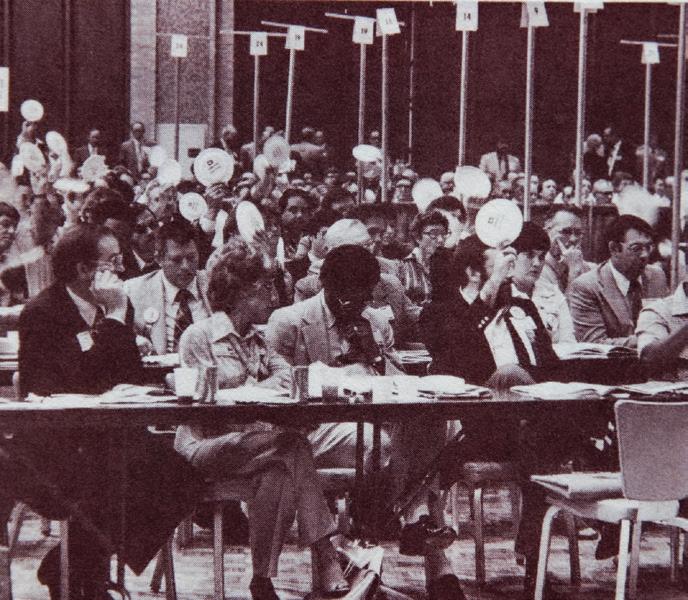
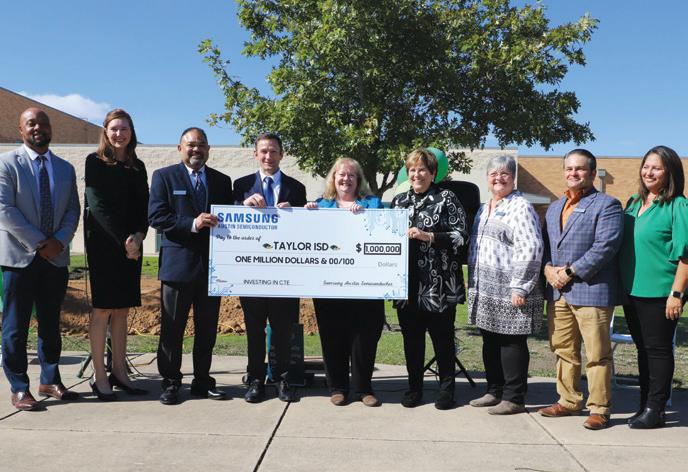
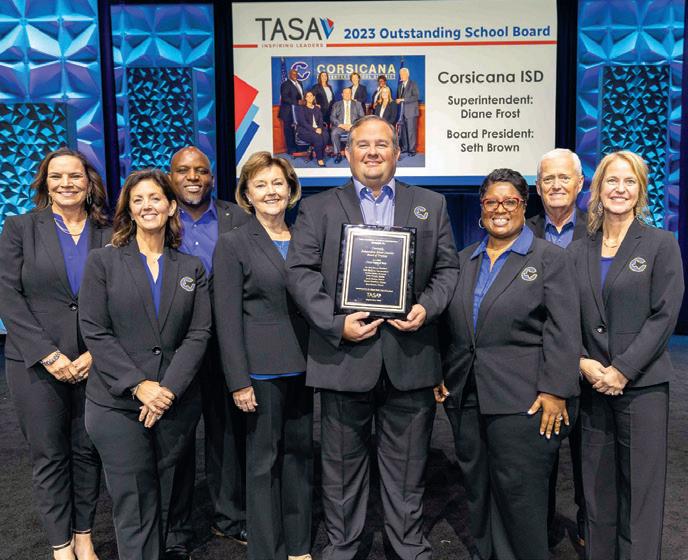

8 Amplified Voice
Delegate Assembly unites Texas school boards
14 Small Town, Big Tech
Samsung brings big opportunities to Taylor ISD
18 Honor Boards
Trustees work to maintain focus on students
Texas Lone Star • Volume 42, Number 5
Texas Association of School Boards P.O. Box 400 • Austin, Texas • 78767-0400 512-467-0222 • 800-580-8272
Laura Tolley • Managing Editor Shu-in Powell • Graphic Designer
Lalo Garcia • Photographer
360 Press Solutions • Printer
Contributors: Sylvia Wood, Beth Griesmer, Mary Ann Lopez, Theresa Gage-Dieringer, Melissa Locke Roberts, Dax González, Savanna Polasek, Leslie Trahan, Joy Baskin, Vanessa Diamos, John Pyle, Jennifer Barton
Texas Lone Star (ISSN 0749-9310) is published 10 times a year by the Texas Association of School Boards. Copyright© 2024 by the Texas Association of School Boards (TASB). All rights reserved. Reproduction, adaptation, distribution, and exhibition in whole or in part are prohibited under penalty of law without the written license or permission of TASB. Copies of Texas Lone Star are mailed to trustees of TASB member school boards and their superintendents as part of their membership. Subscriptions are available to nonmembers for $36 (1 year), $69 (2 years), and $99 (3 years). Single copies are $5.
Address changes should be sent to Michael Pennant, TASB, P.O. Box 400, Austin, Texas 78767-0400.
Articles in Texas Lone Star are expressions of the author or interviewee and do not represent the views or policies of TASB. Permission to reprint should be emailed to communications@tasb.org or addressed to the Managing Editor, P.O. Box 400, Austin, Texas 78767-0400.
Texas Lone Star does not guarantee publication of unsolicited manuscripts.
22 A History of Service
James B. Crow Award winner shares inspiration
Postmaster: Send address changes to TASB, P.O. Box 400, Austin, Texas 78767-0400.



issuu.com/tasb-org | June 2024 | 3 Follow us: Features
Departments 2 Calendar 24 Legal News 26 Capitol Watch 28 HR Files 32 News & Events Columns 5 From the Top 7 Editor’s Note 42 A Closer Look Contents | June 2024


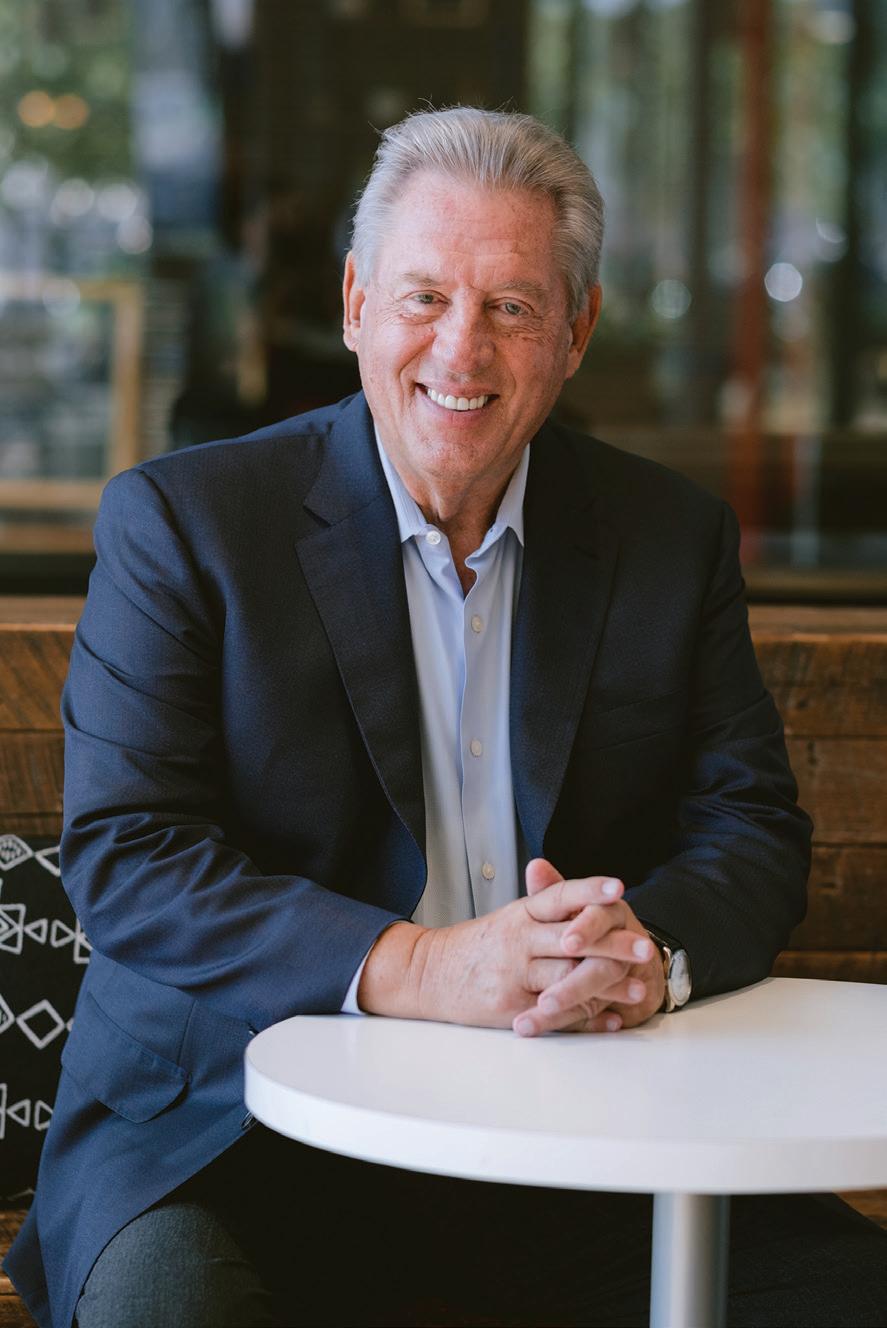
Jose Hernandez Astronaut, CEO, engineer, scientist, and author Nancy Giordano Exponential strategist, business futurist, and author John Maxwell Author, speaker, coach, and leader Ideas. Insights. Inspiration. Shaping Public Education Together Introducing the txEDCON24 general session speakers! GET READY TO BE INSPIRED! Sept. 27–29 • San Antonio Henry B. González Convention Center Registration opens July 23. Visit tasa.tasb.org for more information.
Values in Action
Community support
by Armando Rodriguez
is vital to school districts’ mission
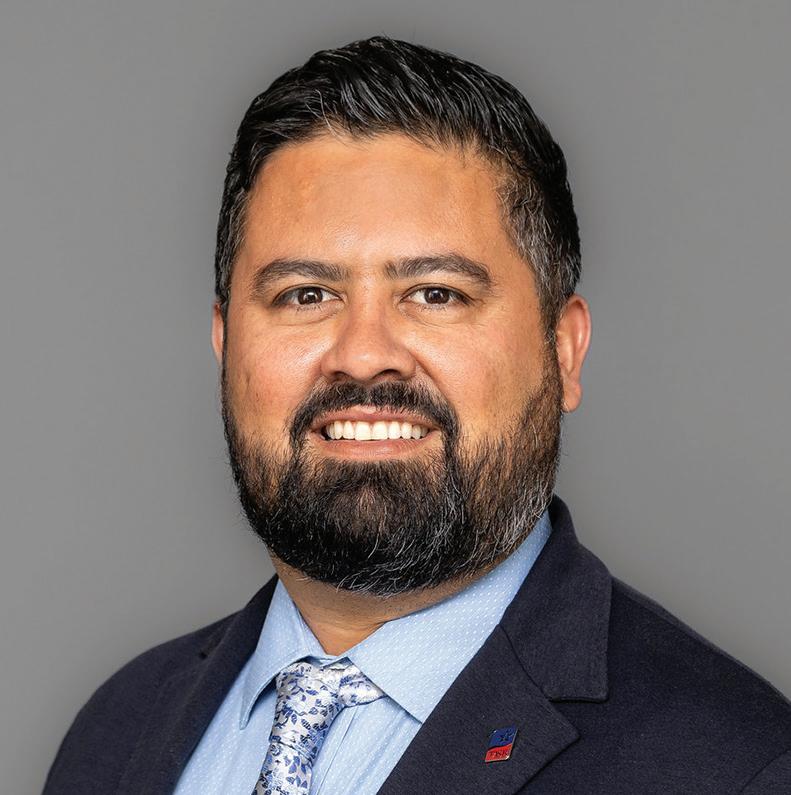
As we approach the summer months, I find myself reflecting on the core values that bind us together as a community of educators, leaders, and advocates for public education. Family, community, and unity are not just words, they are guiding principles that shape our actions and decisions each day.
Today, I am writing to you with a sense of deep gratitude and inspiration, as my home school district, Canutillo ISD, recently experienced an important victory that exemplifies these values in action. On May 4, the Canutillo community passed the largest bond election in the history of our district.
their tax dollars as we seek to provide the best education possible to our students.
Success rooted in strong values
At the heart of our bond election success lies in the profound sense of family that defines Canutillo ISD. Our district is not just a collection of students, teachers, and administrators; it is a closeknit community bound together by a common purpose and shared values. It is through this deep sense of connection that we were able to rally support and overcome misconceptions and misinformation to achieve victory.
I know I’m not alone in celebrating a positive bond election result. Congrat-
We are dedicated to showing we are trusted stewards of their tax dollars as we seek to provide the best education possible to our students.
While it was a close margin of victory, the outcome is significant because it represents the culmination of years of perseverance and dedication, this election having been our third attempt in the last four years to earn the trust of our community.
Through unwavering commitment to our shared goals and a steadfast belief in the power of unity, we overcame past hurdles. I am grateful to those who supported our district’s goals, but I also understand that there is more work to be done to earn the trust of others in our community. We are committed to working hard to fulfill the promises we have made to the Canutillo community. We are dedicated to showing we are trusted stewards of
ulations to my fellow trustees who were successful in getting your bond elections approved this spring. It’s never easy, right? Unfortunately, I also know that some of you didn’t get the results you wanted. I truly understand your disappointment. But keep trying. We did — and we will keep working in the community to win even more support as we move forward with our plans.
At Canutillo ISD, central to our strategy was the cultivation of a strong sense of community. It’s also part of our long-term efforts as well. By engaging stakeholders from across the district and fostering open dialogue and collaboration, we were able to showcase the critical need for modernization and improvement
in our facilities. This victory is a testament to the power of community and the collective impact we can achieve when we work together toward a common goal.
The passage of the Canutillo Bond 2024 is not just a triumph for our district and our students, it is a victory for public education and a testament to the resilience and strength of our communities.
Family, community, unity
As I reflect on the values that guided us, I am reminded of the fundamental principles that define TASB as a trusted organization: family, community, and unity. These values are the cornerstone of our work, and they serve as a guiding force in the decisions we make and the actions we take each day.
As we navigate the challenges and opportunities that lie ahead, I encourage you all to keep these values at the forefront. Together, as a family of educators and advocates, we have the power to effect positive change and shape the future of public education in Texas. Let’s continue to cultivate strong communities, foster unity, and work together toward a shared vision of excellence and equity for all students. In the spirit of family, community, and unity, I am confident that we can overcome any obstacle and achieve great things together.
Thank you for your dedication, your passion, and your unwavering commitment to the students of Texas. Together, we will continue to make a difference and build a brighter future for generations to come.H
Armando
Rodriguez, president of the Canutillo ISD board of trustees, is the 2023-24 president of TASB.
issuu.com/tasb-org | June 2024 | 5 From the Top
Armando Rodriguez

buyboard.com • 800-695-2919 • @buyboardcoop in We know budgets are tight. Stretch your budget dollars further and save valuable staff time by letting BuyBoard handle the RFP process for you. Make the procurement process more efficient for your team. Get more at buyboard.com/texas staff time.
Team Effort
A collective voice helps public education
by Laura Tolley
We’ve reached the halfway point in our year-long project to highlight TASB’s 75th anniversary in the pages of Texas Lone Star. In every issue this year, we’re honored to write about the Association’s proud history of helping school boards and districts by providing high-quality services, visionary leadership, and skilled advocacy.
There’s a lot to write about! To recap a bit, the project began with a look at how it all began 75 years ago. The TLS staff next delved into different topics and various ways that TASB has always helped school boards and districts provide the best education possible to their students. In March, we wrote about the evolution of TASB services, including a separate story about the TASB Risk Management Fund, which is marking its 50th anniversary this year. The April issue featured an article about how school board training has always been a top priority here at TASB. And the history story in May discussed how TASB has always turned to its members for leadership in guiding the organization. Like I said, there’s a lot of proud history of service here.
TASB’s advocacy efforts
This month’s issue focuses on TASB’s advocacy efforts and its commitment to give member school boards a voice in establishing the Advocacy Agenda, the two-year action plan used to advocate for public schools, particularly at the Texas Capitol.
“I think anybody that successfully runs for school board necessarily becomes an advocate for public schools,” Charles Stafford, a Denton ISD trustee who was TASB President in 2016-17, said in an interview last year.
TASB has always appreciated the commitment and expertise of these dedicated public school advocates. The Association also has understood the importance of harnessing the collective strength of member school boards across the state in its efforts to advocate for public education at the Texas Capitol and beyond.
The history story that begins on page 8 also details the importance of attending Delegate Assembly, the final step in establishing the Advocacy Agenda. Since the first Delegate Assembly was held in September 1967, TASB has invited every Active Member to participate in TASB’s official membership meeting by sending a delegate and alternative to attend. This year’s Delegate Assembly will be held Saturday, Sept. 28, in conjunction with txEDCON24 in San Antonio. Mark your calendar!
TASB employees’ dedication
In working on this history project with so many people, I’m reminded of the deep passion TASB staff members have for public education and for serving our members throughout Texas.
Many TASB staff members themselves are the proud products of Texas public schools, including one who wrote about her hometown district in this month’s issue.
Savanna Polasek is a communications specialist at TASB who also writes stories for the magazine. Recently, she ventured back to Taylor ISD to talk to school leaders there about how Samsung Austin Semiconductor's planned facility is creating some pretty major changes in the small [but growing] town Polasek once called home.
When Polasek was growing up in Taylor, she says the Austin metropolis
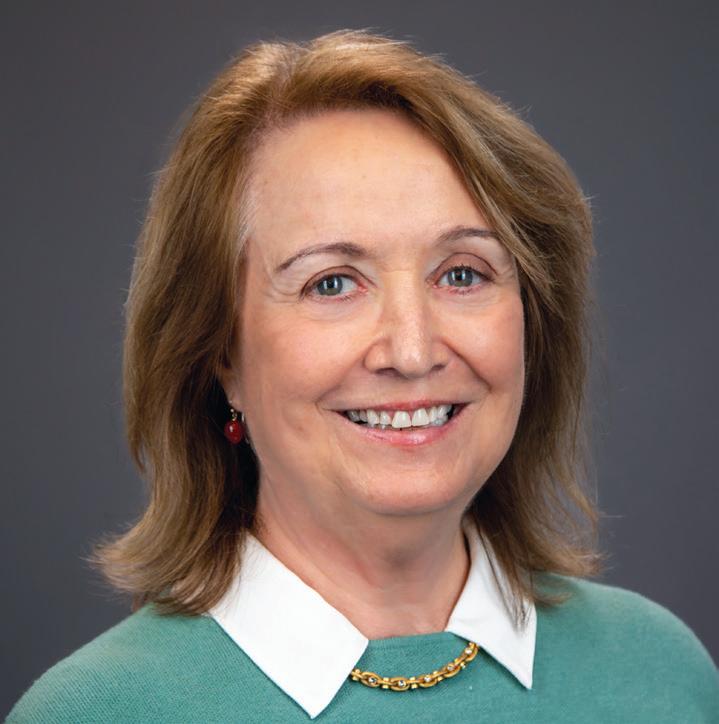 Tolley
Tolley
seemed like a million miles away, even though it’s really about 40 miles to the west. Her town was small and homey, featuring Victorian homes, a historic downtown, and antique shops. She and her friends’ childhood games focused on pioneers, cowboys, and wagons. After all, she explains, that time didn’t seem so far away.
But now the future is coming to Taylor in a very impressive way. From Taylor High School you can see the first phase of the massive $17-billion Samsung facility is almost complete. The development seems to be opening up some significant opportunities for Taylor ISD and its students.
“I wonder if students will now pretend with robots, computers, and spaceships in mind,” Polasek shared. “After all, the tech that powers our world starts with the microchips being developed right in their backyard.”
From playing pioneers to writing about pioneering technology, our own Taylor ISD alumnus brings knowledge and insight to this story about one Texas school district.
I hope you enjoy the issue!H
 Laura
Laura
Tolley
is managing editor of Texas Lone Star
issuu.com/tasb-org | June 2024 | 7
Editor’s Note
Laura
AMPLIFIED VOICE
DELEGATE ASSEMBLY UNITES TEXAS SCHOOL BOARDS
by Beth Griesmer and Laura Tolley
Editor’s note: In every issue of Texas Lone Star this year, the magazine will honor TASB’s 75th anniversary by writing about the positive impact the Association has had on Texas public schools through its high-quality services, visionary leadership, and skilled advocacy. Additionally, these articles will highlight the significant events, people, legislation, and issues that have shaped public education in Texas. Overall, these articles reflect how TASB and school leaders work hard together to promote educational excellence for all Texas schoolchildren.
Each year at txEDCON, the room for TASB’s Delegate Assembly is set up with precision and everything is in place hours before delegates fill the rows of seats to finalize TASB’s Advocacy Agenda, vote on directors and officers, and conduct other Association business.
“My first Delegate Assembly, I thought, ‘What am I doing here?’ and ‘How do I make a difference?’” said Larry “Doc” Hawthorne, president of the Hubbard ISD school board, a small rural district northeast of Waco. Hawthorne has been a Hubbard ISD trustee for 34 years and has participated in Delegate Assembly for more than two decades.
The establishment of Delegate Assembly marked a milestone in TASB’s history and its advocacy work. At the annual convention in 1966, Texas trustees in attendance unanimously voted to create a Delegate Assembly to provide a structure for TASB member boards to have a direct and equal voice in the determination of TASB priorities.
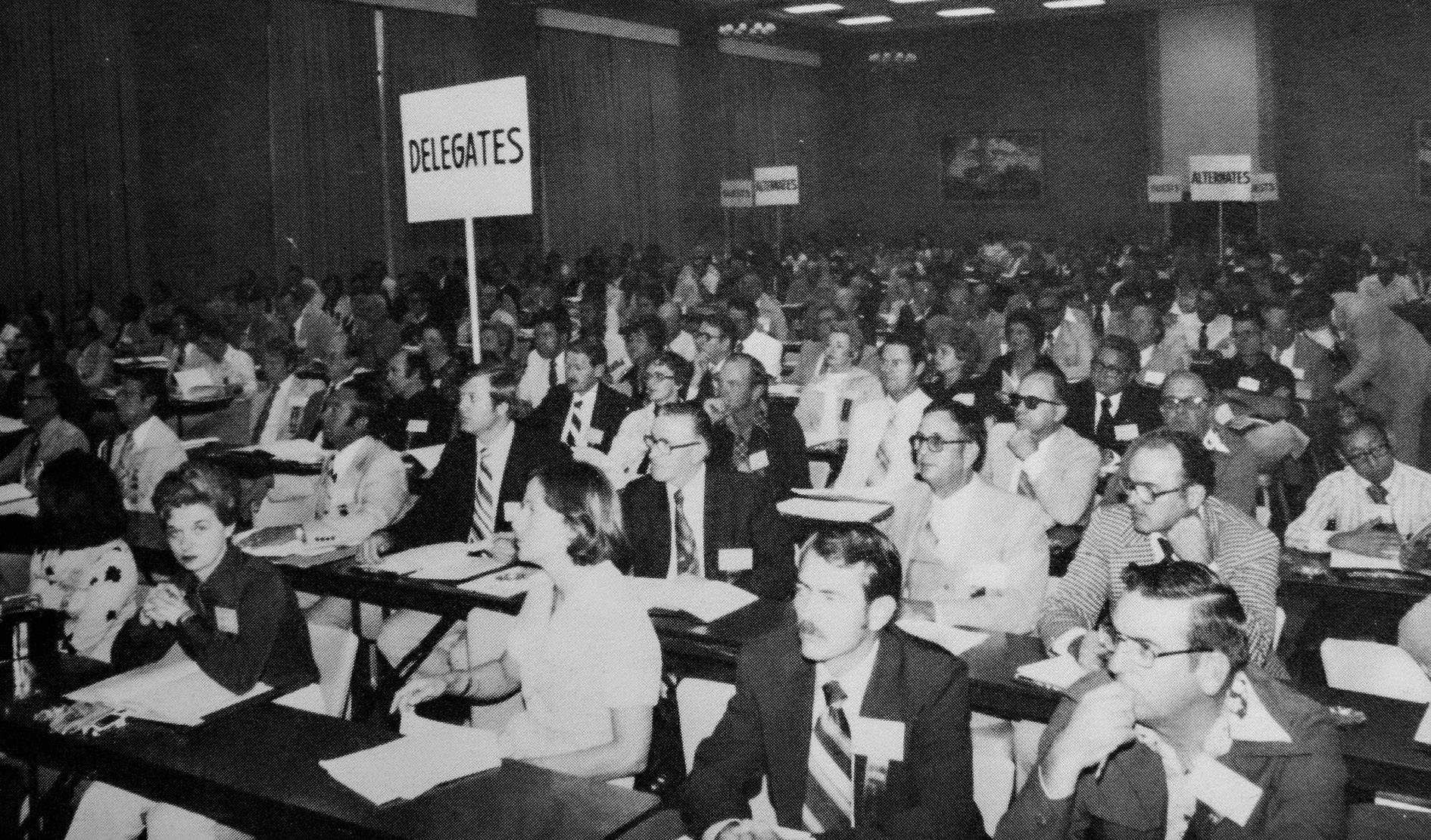
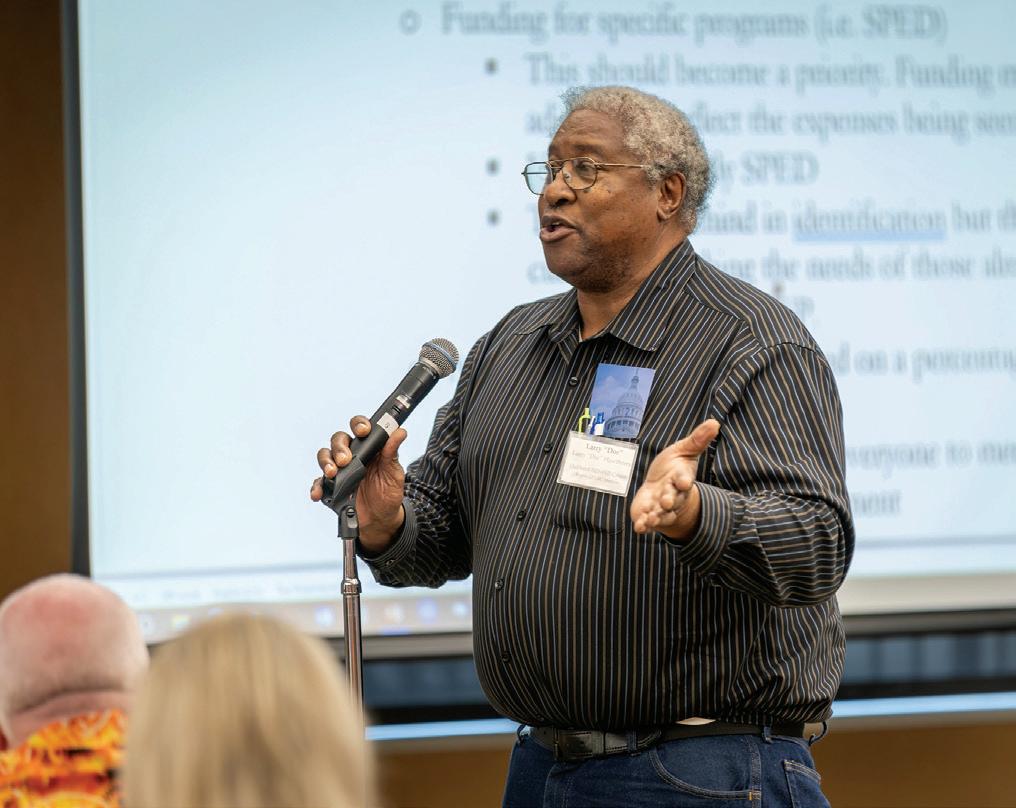
8 | June 2024 | issuu.com/tasb-org
Attendees at the 1977 Delegate Assembly.
Photo from TASB archives
Larry “Doc” Hawthorne, Hubbard ISD school board president, speaks at the Legislative Advisory Council meeting held in April. Hawthorne has participated in the TASB Advocacy Agenda process for more than two decades.
Photo by TASB Media Services
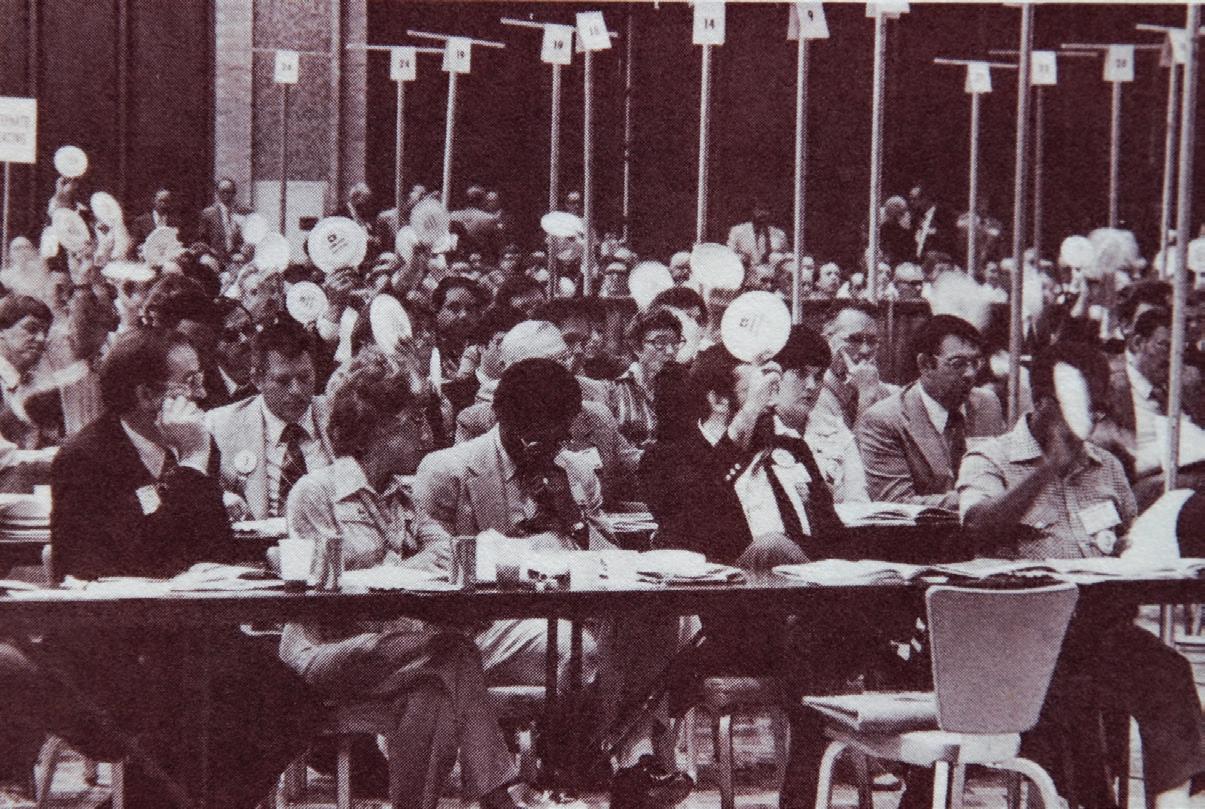
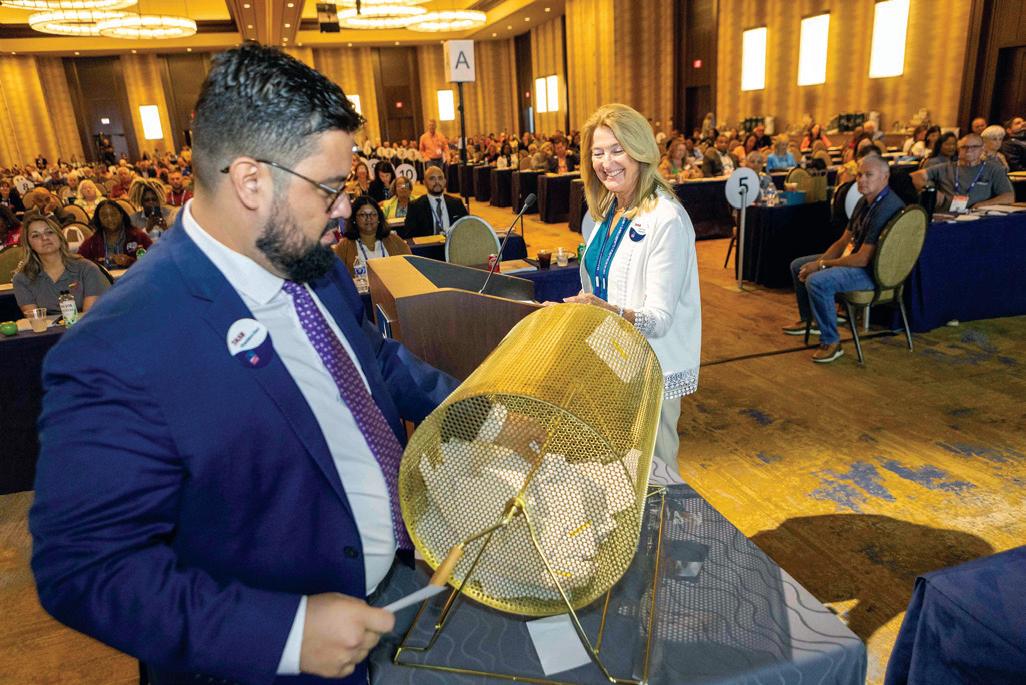
The first ever Delegate Assembly was held in Austin the next year, on Sept. 23, 1967, when 101 delegates considered resolutions and Association business. Since then, every Active Member has been invited to participate by sending a delegate and alternate to attend.
“It’s a rewarding experience in several ways,” Hawthorne said about his decades-long participation. “First, it gives you an opportunity to see things from more than just your local level to a statewide level, which broadens your understanding of the needs across the state. From a local district, we know what our needs are. But when we go to Delegate Assembly and go to Grassroots Meetings and go to legislative advisory type meetings, now we see how they all intertwine.”
Since it was established 75 years ago, TASB has understood the importance of advocacy and in harnessing the power of its school board members to amplify those efforts. Delegate Assembly marks a crucial step in that process as it establishes the TASB Advocacy Agenda — the two-year action plan used to guide TASB’s advocacy efforts at the Texas Capitol and beyond.
Over the years, as the Association has grown and advocacy needs have evolved, TASB has continuously refined and innovated its processes to ensure that the needs and priorities of member boards are heard and included.
Last year’s legislative season, which included four special sessions, highlighted the vital role advocacy plays in TASB’s mission to serve public school boards across Texas.
"Allowing school board members to participate in the development of the Advocacy Agenda and take part in the Delegate Assembly is crucial because it ensures that the diverse perspectives and insights from those who work closely with students, teachers, and the community are directly included in decision-making processes, including for our legislative priorities,” said Renae Mitchell, president of the Pflugerville ISD board, a large district north of Austin.
Mitchell said the TASB advocacy process encourages board members from small-to-large school districts to share their valuable viewpoints. “This participation fosters more comprehensive and effective advocacy efforts, leading to policies and initiatives that better address the needs and aspirations of our diverse student population, local schools, and their stakeholders. All our expressions come together united as one voice in advocacy for public education."
Advocacy in the beginning
Since its inception, TASB has been dedicated to giving member school boards the opportunity to help establish a unified voice for public education. During the first TASB gathering in November 1949, 100 trustees met to discuss several issues, including the formation of a plan that was similar to today’s Advocacy Agenda. And as public education evolved, the Association began to focus its efforts more on the Texas Legislature and other arenas.
“TASB has always worked to ensure that every Active Member has the opportunity to participate in and directly contribute to the formation of the organization’s advocacy goals,” said TASB Executive Director Dan Troxell. “The Advocacy Agenda is the result of a truly grassroots process and is designed to represent the issues that matter most to our member boards and their school district communities across Texas.”
In TASB’s early years, the development of its legislative program featured members gathering in Austin to discuss those top issues and draft those priorities to guide the Association’s advocacy work.
TASB expanded that process in July 1990 with the formation of the Grassroots Advocacy Task Force, which consisted of 25 school board members from across the state. The task force, chaired by Wylie ISD trustee Alan Leverett, recommended that “TASB take the Association to its members, rather than ask school board members to come to Austin.”
issuu.com/tasb-org | June 2024 | 9
Attendees vote at the 1981 Delegate Assembly.
Photo from TASB archives
TASB President Armando Rodriguez, Canutillo ISD board president, and TASB President-Elect Rolinda Schmidt, a Kerrville ISD trustee, draw winning districts for the $1,000 student scholarship given to 10 districts that participated in the 2023 Delegate Assembly.
Photo by TASB Media Services
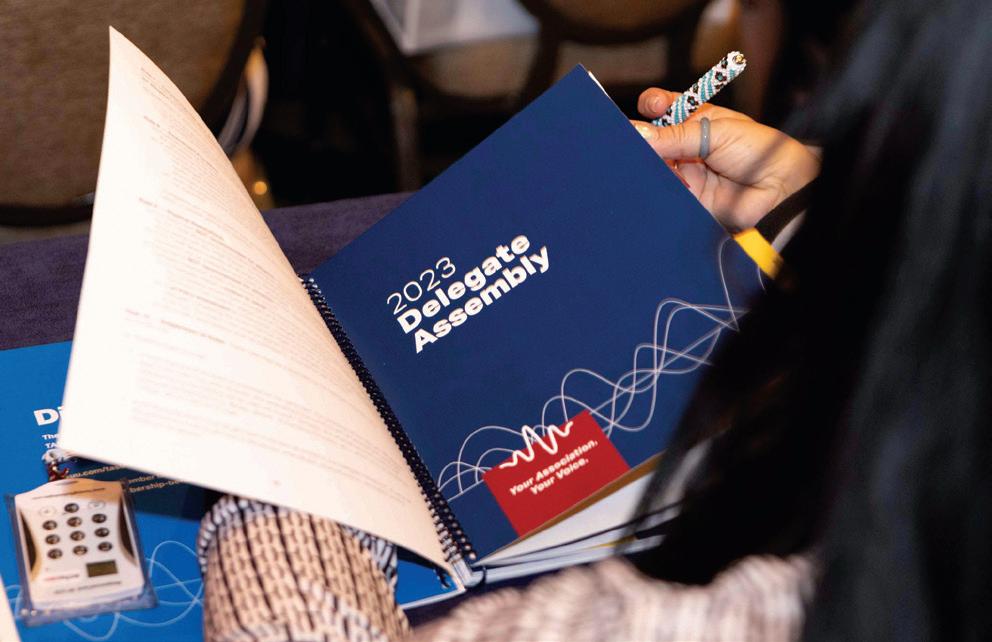
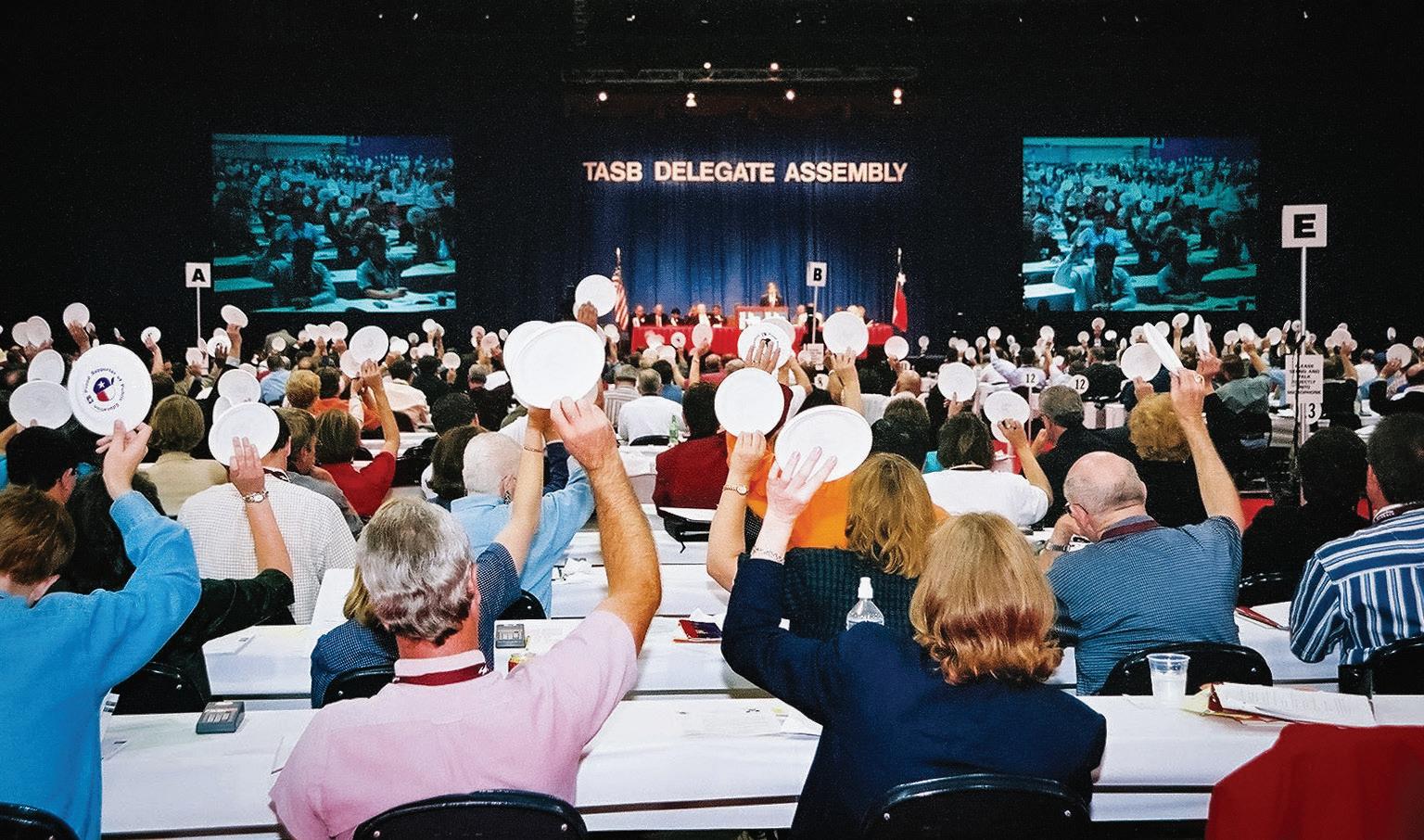
It was an important step toward including member voices from all parts of Texas.
“If TASB is to remain a strong representative of Texas school boards, the Association consistently must check the pulse of its membership to determine organizational positions on vital issues facing Texas education,” said Billy Walker, the TASB executive director at that time.
By 1992, TASB formed a comprehensive plan for developing its legislative agenda that had two processes. The first involved hosting regional Grassroots Meetings to hear trustees’ perspectives about local priorities that would then be proposed to the TASB Board of Directors before being presented at Delegate Assembly. The second process gave local boards the opportunity to submit resolutions directly to the TASB Board for consideration and then to Delegate Assembly for adoption. The results of those two processes created the Advocacy Agency.
Gathering input at all levels
Today, TASB’s grassroots process gathers valuable input from local trustees at every point in the development of its Advocacy Priorities. First, during even-numbered years, an electronic survey is distributed to all school board members asking what issues are most important to them. Those results are shared with trustees who attend the Grassroots Meetings, which are held that same year in each of the 20 education service center regions.
“What you all do today is a foundational step in developing what will eventually become the priorities that you all consider at TASB Delegate Assembly,” Dax González, division director of TASB Governmental Relations, told a group of trustees gathered for the Region 13 Grassroots meeting on Jan. 10.
“The fact that so many districts and so many perspectives are represented in this room is really the strength of this process,” said Lynn Boswell, Austin ISD trustee and
TASB director. Boswell helped lead the Grassroots Meeting for Region 13 and guided fellow trustees through voicing priorities they brought from their districts.
At each Grassroots Meeting, trustees discuss and then vote on the issues most critical to their area, narrowing it down to their top five priorities. They also elect trustees to serve on the Legislative Advisory Council. Those LAC members, whose numbers are determined by student enrollment, will then work together to distill the regional priorities into one statewide list to recommend to the TASB Board of Directors.
“Looking back on almost 20 years at TASB, the one thing that has stood out the most to me has been our focus on our members — and that includes the continual improvement of our Advocacy Agenda process that is centered on member input and participation,” González said. “Very few, if any, membership associations go to the lengths that TASB does to gather as much local member voice as possible so that we can represent those voices at the Texas Capitol and beyond. That focus on our members drives me every day, and it’s something we can all be proud of.”
In another step to ensure representation, four LAC members are elected to sit on the TASB Board of Directors’ Legislative Committee, where they work to make sure the voice of local trustees is heard at the table when the Board makes its recommendations to Delegate Assembly.
Finally, through the resolutions process, member boards may submit issues that are important to them for consideration and possible inclusion in TASB’s broader legislative program. Advocacy Agenda Resolutions help direct TASB’s response to issues that may come up during the legislative biennium and are not directly addressed by the priorities.
“There are bound to be issues that arise during a legislative session that just aren’t covered by our Advocacy Priorities,” said González. “The resolutions process provides another important layer of guidance from our members.”
10 | June 2024 | issuu.com/tasb-org
Attendees vote at the 2002 Delegate Assembly.
Photo by TASB Media Services
An attendee looks through the 2023 Delegate Assembly handbook.
Photo by TASB Media Services
Delegate Assembly
The culmination of this grassroots process happens each year at Delegate Assembly, which coincides with txEDCON, the largest gathering of K-12 public education leaders in the state.
As TASB’s official membership meeting, delegates vote on a range of leadership and business matters. The meeting is held annually, and every Active Member board is strongly encouraged to send a representative to Delegate Assembly, where they can take an active role in determining the Association’s future.
“You can have one representative from your district,” said Hawthorne. “You can have a voice.
“To me, it was always important to go to Grassroots Meetings, follow the grassroots process. And then go to the Delegate Assembly and go through that process,” Hawthorne said. “Without that you don’t know the founding parts of how the priority got started.”
Throughout the Delegate Assembly experience, there are many opportunities for members to be heard. The process starts with Regional Caucus meetings, which is an opportunity to share lunch with fellow regional representatives. These discussions offer clarity on issues before the Assembly and insight into the process, particularly for new delegates.
“The experience of advocating at the Delegate Assembly is transformative,” said James Matlock, a Hutto ISD trustee. Delegates can address the Assembly from the floor about items under consideration during the proceedings. “It fosters collaboration and dialogue among board members, allowing us to exchange ideas, share best practices, and collectively address the challenges facing public education.”
Hawthorne encourages all board members to be part of this advocacy process. “You have an opportunity to persuade other trustees about your position,” he said.
TASB is now accepting submissions of resolutions to be included in TASB's 2024-26 Advocacy Agenda. Resolutions must be submitted by June 17. All submissions from Active Member districts will be reviewed by the TASB Board and ultimately acted upon by the TASB Delegate Assembly during its meeting on Sept. 28.
“Be genuine and tell your story. Tell how it affects student outcomes, because at the end of the day that is what it’s all about. We all want better outcomes for our students.”
Once Delegate Assembly attendees have completed their business, the Agenda is set and ready to be used by TASB and its members to advocate on behalf of public schools and Texas schoolchildren.
With Delegate Assembly being such an integral part of TASB’s long history of serving school boards and Texas public education, there’s an ongoing commitment by the TASB Board to make sure this pivotal event continues to serve the needs of members and foster participation.
“We always want to make sure the experience is the best one possible and encourage more school boards to take part,” said Rolinda Schmidt, Kerrville ISD trustee and TASB Board president-elect. Schmidt has been leading a special committee looking at ways to strengthen Delegate Assembly as TASB looks to the next 75 years.
“Delegate Assembly truly empowers TASB members to have a voice in creating positive changes in Texas public education. We want to ensure it continues to serve our Association and advances the needs of our students for generations to come,” Schmidt said.H
Beth Griesmer is a staff writer for Texas Lone Star. Laura Tolley is managing editor of Texas Lone Star.
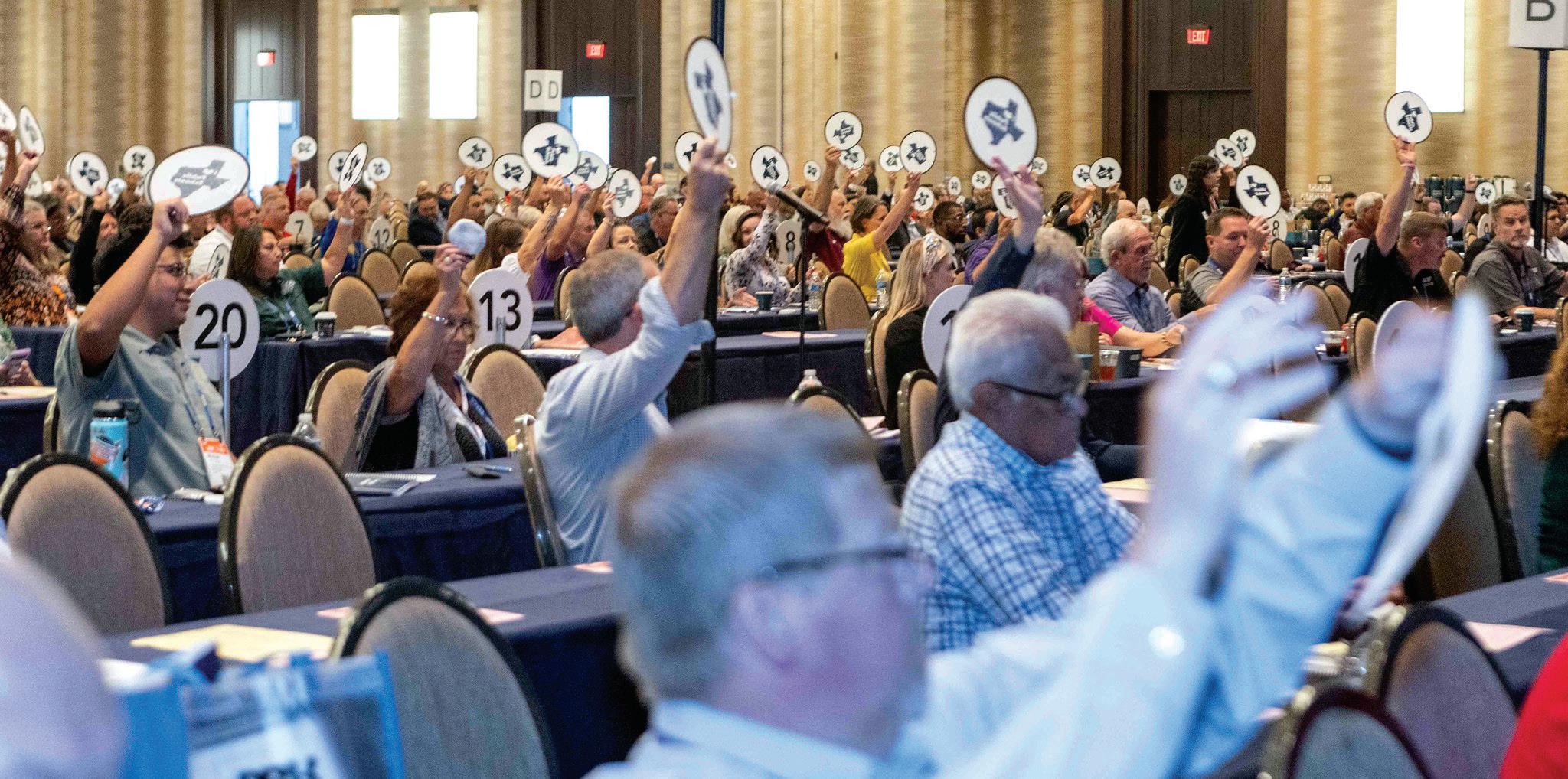
issuu.com/tasb-org | June 2024 | 11
Attendees vote at the 2023 Delegate Assembly.
Photo by TASB Media Services
HOW TASB'S ADVOCACY AGENDA IS CREATED
PRIORITIES
Grassroots Meetings
(Even-numbered years)
Local school leaders work together to develop regional priorities. Representatives are elected to the TASB Legislative Advisory Council (LAC).
LAC meetings
LAC members identify common priorities from regional meetings and recommend a list of priority statements to the TASB Board.
Priorities reviewed
The TASB Board of Directors reviews the Priorities and makes a recommendation to the Delegate Assembly.
RESOLUTIONS
TASB advocates at the Capitol on behalf of Texas school boards
The Advocacy Agenda is the action plan and guide for TASB staff working on your behalf at the Capitol.
Boards
submit advocacy resolutions
Local school boards submit stances to TASB to help guide the Association’s response to issues that might arise before the Legislature.
Legislative Session (Odd-numbered years)
Resolutions reviewed
The TASB Board of Directors reviews proposed Resolutions and makes a recommendation to the Delegate Assembly.
Delegate Assembly
Texas school boards appoint one delegate and one alternate to attend TASB's annual business meeting. The Assembly debates and votes on: Advocacy Priorities
• Advocacy Resolutions TASB leadership (board and officers)
The Advocacy Agenda is adopted.
12 | June 2024 | issuu.com/tasb-org
KEEPING MEMBERS INFORMED BUILDING ADVOCACY SUPPORT THROUGH COMMUNICATIONS
by Melissa Locke Roberts
TASB gains input from member school boards from across Texas for consideration in the Advocacy Agenda, which is officially approved by Delegate Assembly. Once that twoyear action plan is in place, it’s also TASB’s responsibility to keep members informed about its advocacy efforts. That has long been a priority at TASB, but the way the Association has communicated advocacy developments to members has evolved over the years as it has capitalized on improved outreach tools.
In the Association’s early days, keeping members up to date on legislative actions that could impact their schools was a challenge. Coverage in printed publications and mailed letters could be too slow, and maintaining a physical presence at the Capitol was impossible for many members.
All that changed with the internet. Late-breaking legislative news became available on the TASB website for the first time in 1997, allowing members to respond quickly. That same year, TASB Governmental Relations added a newsgroup and legislative bill tracking system. In 2001, TASB’s School Board Advocacy Network began using an online tool that helped SBAN members learn about and react to important legislative issues and easily contact legislators.
Broad use of the World Wide Web not only helped members build stronger advocacy efforts, it also helped TASB spread the good news about public education in Texas. “The internet created opportunities for us to promote schools far more broadly than before,” said Karen Strong, former associate executive director of communications and public relations at TASB. “In the early days, we had to buy ads in major newspapers in the state, and that was horribly expensive. So, technology opened up access and helped us increase the frequency of our voice to more varied audiences.”
An important part of TASB’s advocacy process has been to clarify the advantages of public education and debunk myths perpetuated about Texas public schools. Communications technology has played a huge part in furthering that objective.
For example, in 1994, TASB hosted its first Pathfinder teleconference, The Big Lie About Public Schools, to shed light on the facts. In 2013, TASB launched the Truth About Schools website to point out incorrect information being shared within the Texas Legislature. The site became a reliable source for the media to confirm facts. In recent years, the TASB Talks podcast has helped explicate education issues being addressed in the Legislature.
To help increase awareness about public education issues in the state, the Texans for Strong Public Schools site shares facts and allows citizens to easily contact their legislators. More than 285,000 letters were sent to lawmakers during the recent 88th Legislature. Since 2017, more than 425,000 letters have been sent to state lawmakers on behalf of public schools through the program.
“We at TASB are committed to getting the word out about public school accomplishments and challenges as well as helping communities understand the possible effects of proposed legislation,” said Tiffany Dunne-Oldfield, TASB deputy executive director. “An essential tool in those efforts will always be the latest technology to help us communicate quickly and broadly.”
Learn more about how TASB has used technology in its work and on behalf of members in the November edition of TLS
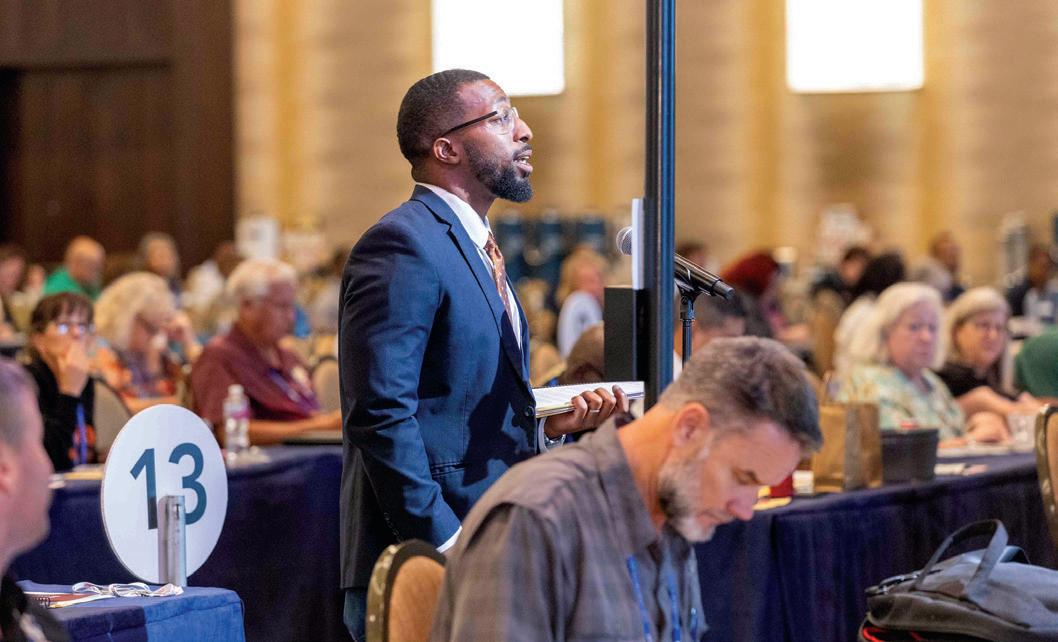
issuu.com/tasb-org | June 2024 | 13
Melissa Locke Roberts is a staff writer for Texas Lone Star.
James Matlock, a Hutto ISD trustee, asks a question at the 2023 Delegate Assembly.
Photo from TASB archives
Samsung brings big opportunities to Taylor ISD
by Savanna Polasek

On her first day as Taylor ISD superintendent, Jennifer Garcia-Edwardsen celebrated the groundbreaking of the district’s new Career and Technical Education Center by accepting a $1 million check from the Samsung Austin Semiconductor.
For this small district in Taylor, that hefty donation marked another transformational impact of the chip maker’s decision to build a $17 billion semiconductor manufacturing facility in this Central Texas community, population 16,267. The gift will allow Taylor ISD to purchase the latest technology for their new CTE center, from welding equipment to 3D printers.
Yet even as the district welcomes the donation and embraces the possibilities that come with being home to Samsung’s new mammoth facility,
there’s still uncertainty about what the future will bring.
“It’s a big change to the community,” said Garcia-Edwardsen. “The community voice is important, especially since we’re a small town experiencing growth. Our residents feel that. Sometimes there is an uneasiness about it. The key is keeping the community in mind and going slow to go fast.”
Across the Lone Star State, several school district communities are experiencing similar growth, thanks to a wave of businesses relocating or investing in Texas. Figuring out how to navigate all the impacts of such business growth and investment is challenging. For communities trying to keep their small-town charm while also maximizing the potential of these generation-defining opportunities to
uplift their economies and residents, the stakes are even higher.
Leading with transparency
As Taylor ISD has seen over the past few years, striking the right balance takes a lot of work and an ongoing commitment to keeping the needs of students and their families at the forefront of the conversation. For the school board, that has meant prioritizing transparency and open communications from the very first public hearing involving Samsung back in May 2021.
“I wanted to make sure we gave the community the opportunity to
14 | June 2024 | issuu.com/tasb-org
Taylor
visit and talk,” said Marco Ortiz, Taylor ISD school board president. “I didn’t want to cut things off or close the hearing until everybody had a chance to ask their questions. I think the community saw us, the board of trustees, as being transparent.”
It ended up being one of their most attended meetings.
“One community member made a comment, ‘You guys have a bunch of lawyers out here telling us this, this, this, but I want you to come down and just explain in layman’s terms what it is,’” said Ortiz. “Our superintendent was able to relay that message. After that, the comment he made was, ‘I understand it now. Thank you.’”
Preparing for the future
Since then, the district has kept its focus on graduating future-ready students through engaging and relevant instruction, including STEM programs and maximizing internship opportunities with Samsung. Not surprisingly, that goal aligns with the needs of a huge multinational corporation, which will require a skilled and educated workforce to ensure its success.
“It’s building a future for the town,” said recent graduate Emilio De La Garza about Samsung’s investment in Taylor, which is located about 40 miles
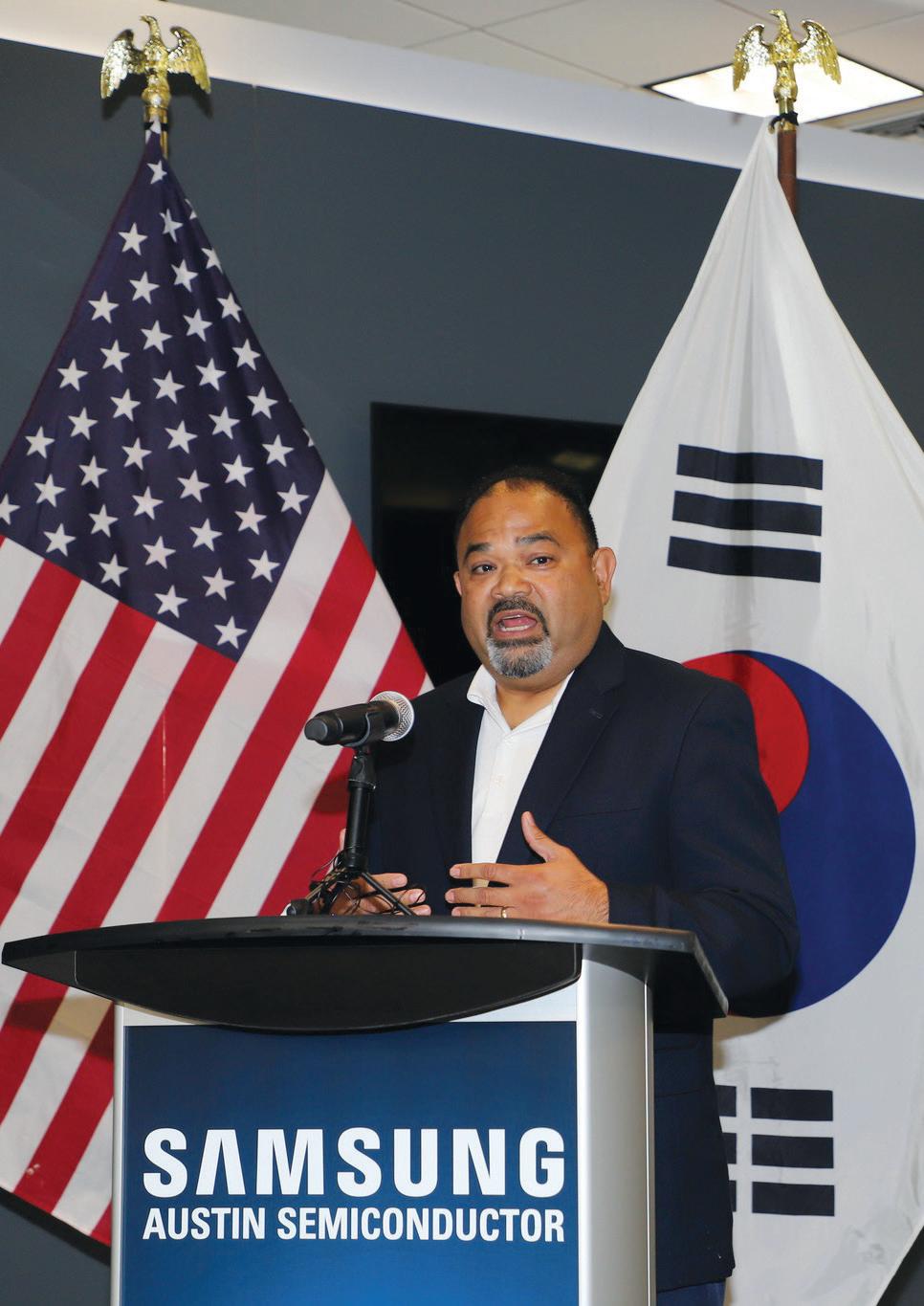
northeast of Austin in Williamson County. “It’s bringing people here; and with more people comes more opportunities.”
De La Garza, a 2023 graduate of Taylor’s ISD Legacy Early College High School, is one of the students who have seen Samsung being built
It’s building a future for the town.
— Emilio De La Garza
from the ground up. Being a part of the first class of Taylor ISD interns at Samsung propelled his interest in engineering, and in the spring of his senior year, he was selected to become a full-time apprentice.
“Most of my decision to go to Samsung was thinking ahead,” said De La Garza. “It’s not a common
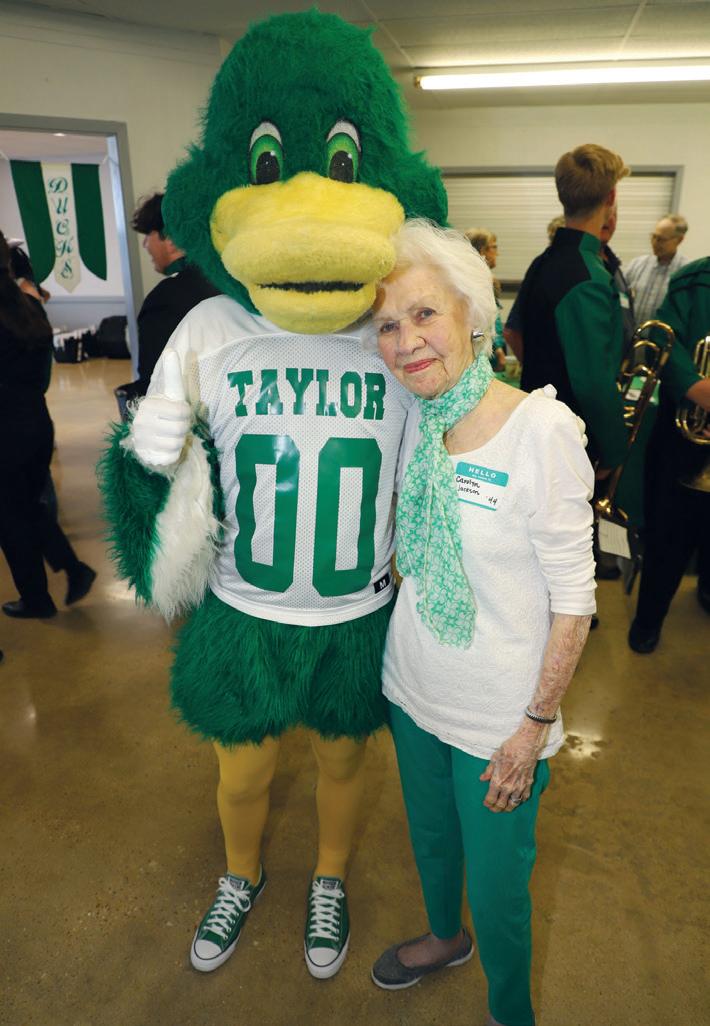
occurrence to have a job right there, ready for you. It almost felt like fate when they reached out to me.”
Thinking ahead is what drew De La Garza to Legacy Early College High School. Career-focused, he earned both his associate degree from Temple Community College and his high school degree at graduation. He can now focus on obtaining his associate degree in advanced manufacturing design from Austin Community College, the last step before he becomes a full-time Samsung employee.
“From the student perspective, [the internship is] just a really great opportunity,” he said. “You get a peek into what’s going on. If it’s something they like, they can hit the ground running as they enter that field, whether that’s engineering or construction or marketing. It’s a net positive.”
One day during his sophomore year in 2021, his principal, Erika Cantwell, tapped him on the shoulder, asking him to speak at the next town hall meeting about his internship experience.
Representing the Legacy Early College High School student body, he shared why he thought Samsung would be a positive opportunity for Legacy students. He was also able to hear the perspective of local business leaders, as well as city government.
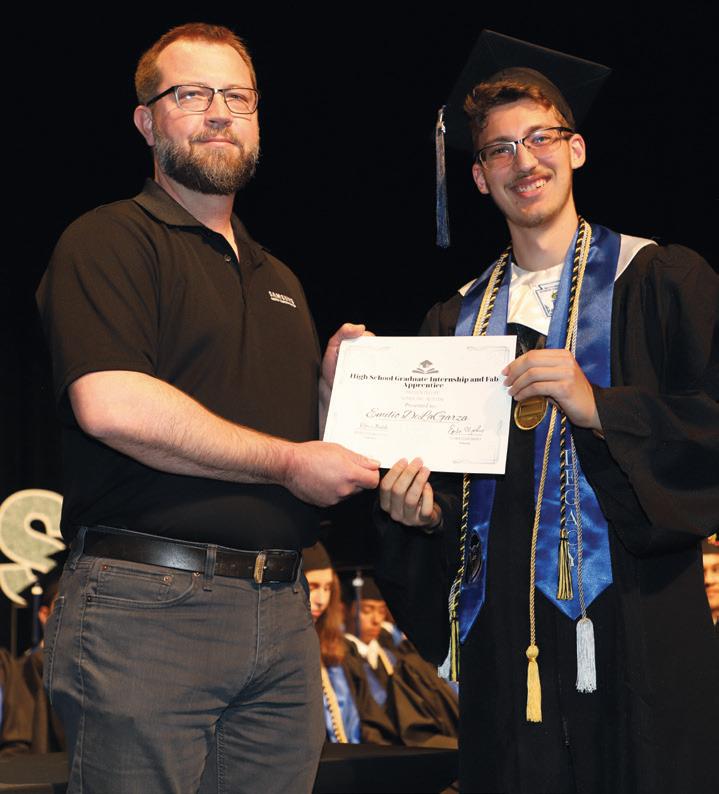
issuu.com/tasb-org | June 2024 | 15 texaslonestaronline.org | July 2023 | 15
Photo courtesy of Taylor ISD
Photo courtesy of Taylor ISD
Photo courtesy of Taylor ISD
Taylor ISD's mascot, Waddles, poses with 1944 graduate Carolyn Jackson at the 2023 homecoming festivities.
Marco Ortiz, Taylor ISD school board president, speaks at an internship celebration hosted by Samsung in August 2023.
Samsung’s Mike Stebbins presents Emilio De La Garza with a certificate awarding him a post-graduate internship at Taylor ISD’s graduation last year.
Those sorts of connections between the students of Taylor ISD and Samsung are expected to grow, especially when the district’s new CTE Center opens in 2025. In addition, Samsung Austin Semiconductor’s internship success has set a precedent for this community, and Williamson County is now requiring all new businesses of a certain size to have meaningful internships for local students.
Changes on the horizon
Meanwhile, a mile and a half from Taylor High School, cranes are in the air, forklifts are moving materials, and Samsung’s new manufacturing facility is taking shape with some 8,000 construction workers hard at work.
In anticipation of the first phase of completion on July 1, Taylor ISD board members and district administrators are busy planning for a future that involves more than four million square feet of new investment into their community. It’s being hailed by both state and federal leaders as a significant milestone in the growing U.S. computer chip industry, which is essential for powering many aspects of modern life, from smart phones to cars to space satellites.
In May, the school board received a new demographics study that will help them plan for more expected growth in Taylor ISD as families move into the area for jobs and opportunities.
Already, Main Street has a little more traffic. Shops and restaurants
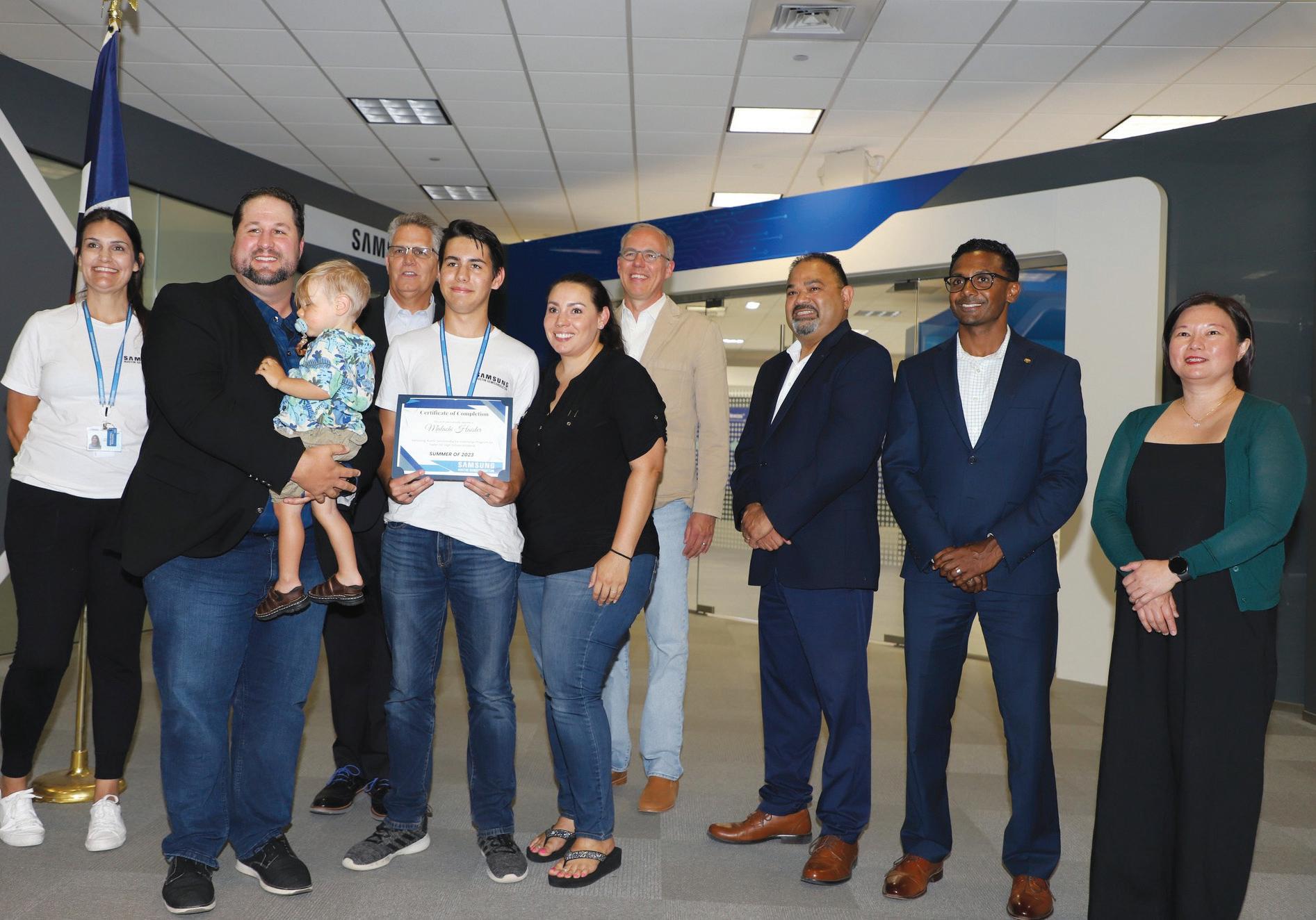
are popping up, and new neighborhoods are sprouting near Samsung.
“We’re hoping it’s a bit more gradual so we can prepare,” said Ortiz. “There are newer subdivisions, and the city is working with developers. Once those homes fill in, I think we’ll see more growth.”
Once a duck, always a duck
Tim Crow, Taylor ISD’s communications and community liaison, said the prevailing attitude among residents has been one of pride and optimism, even with all the changes. The community also loves its Taylor ISD Ducks.
“Taylor has a really rich heritage,”
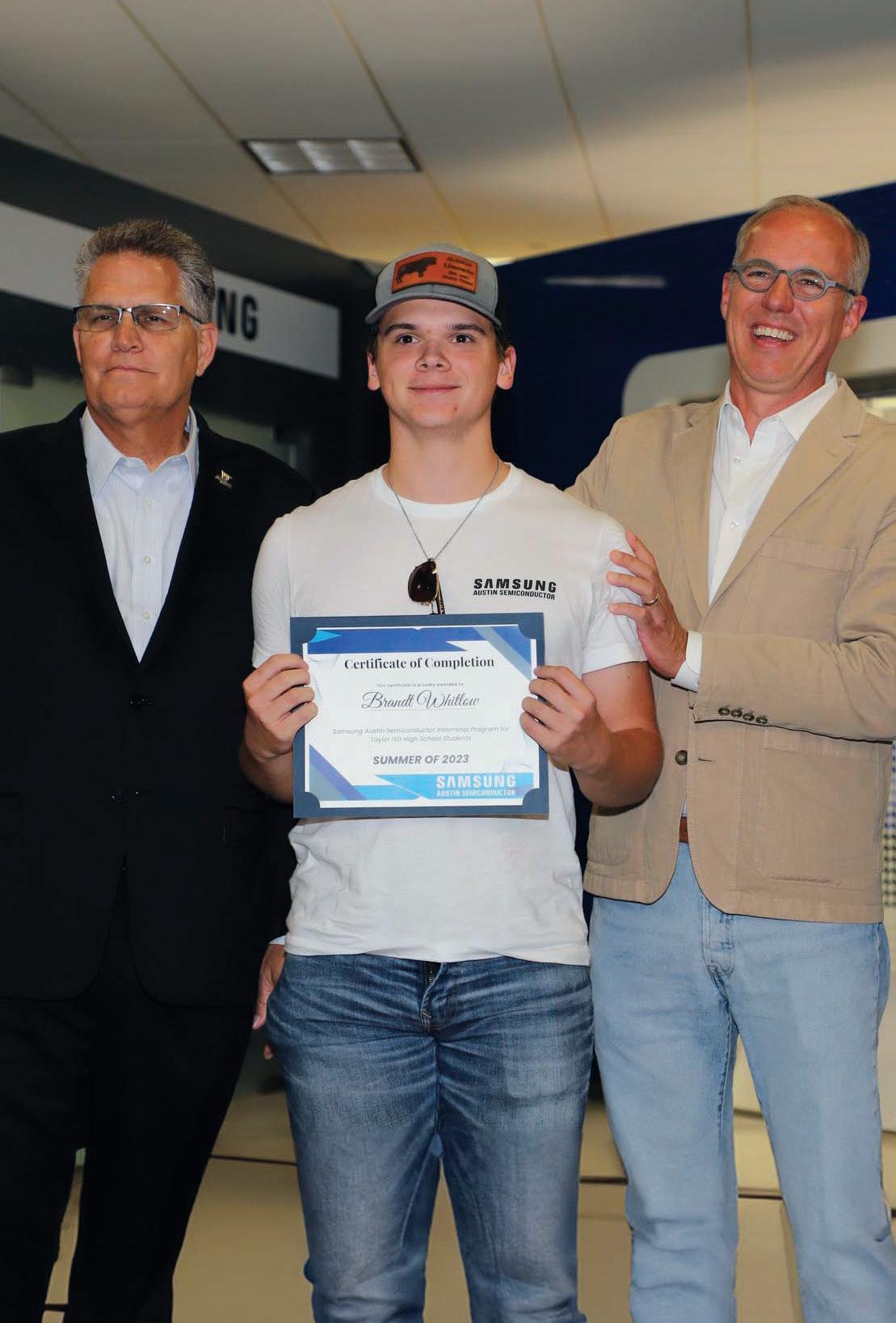
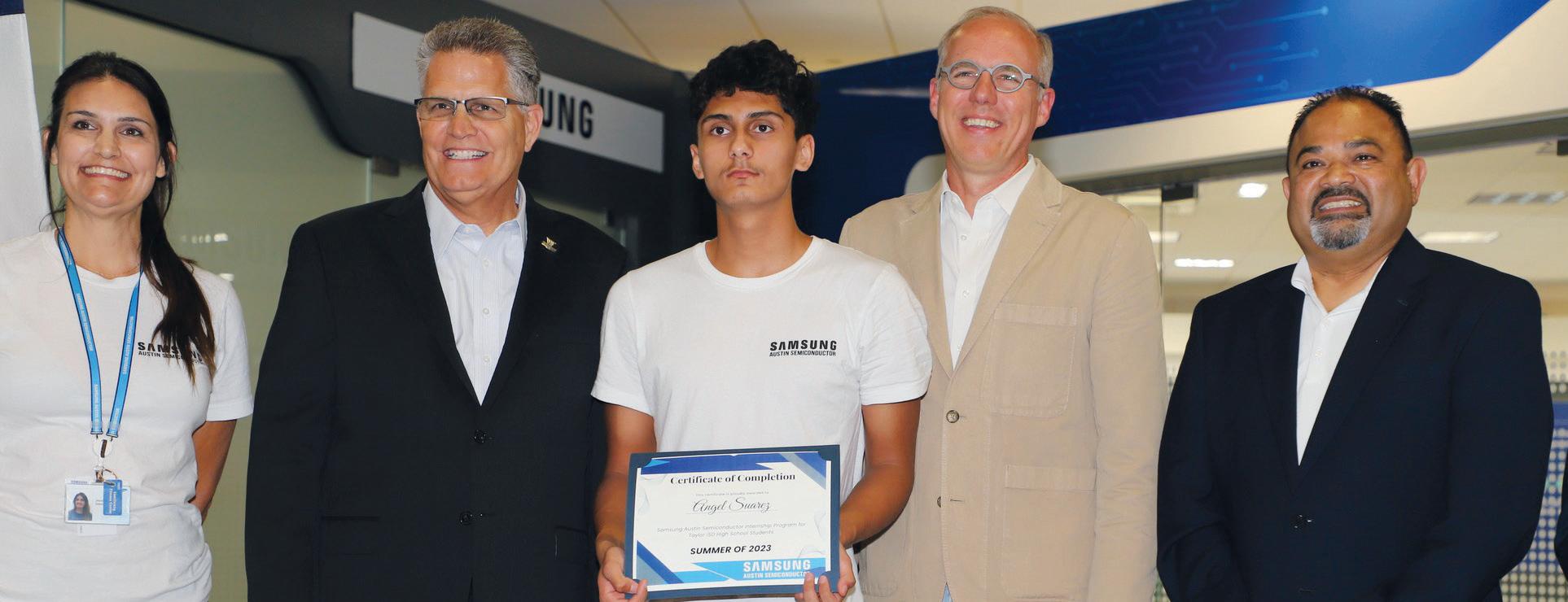
16 | June 2024 | issuu.com/tasb-org
Top and bottom photos: Students pose with local officials and a Samsung representative to commemorate the end of their internship in August 2023.
Photo courtesy of Taylor ISD
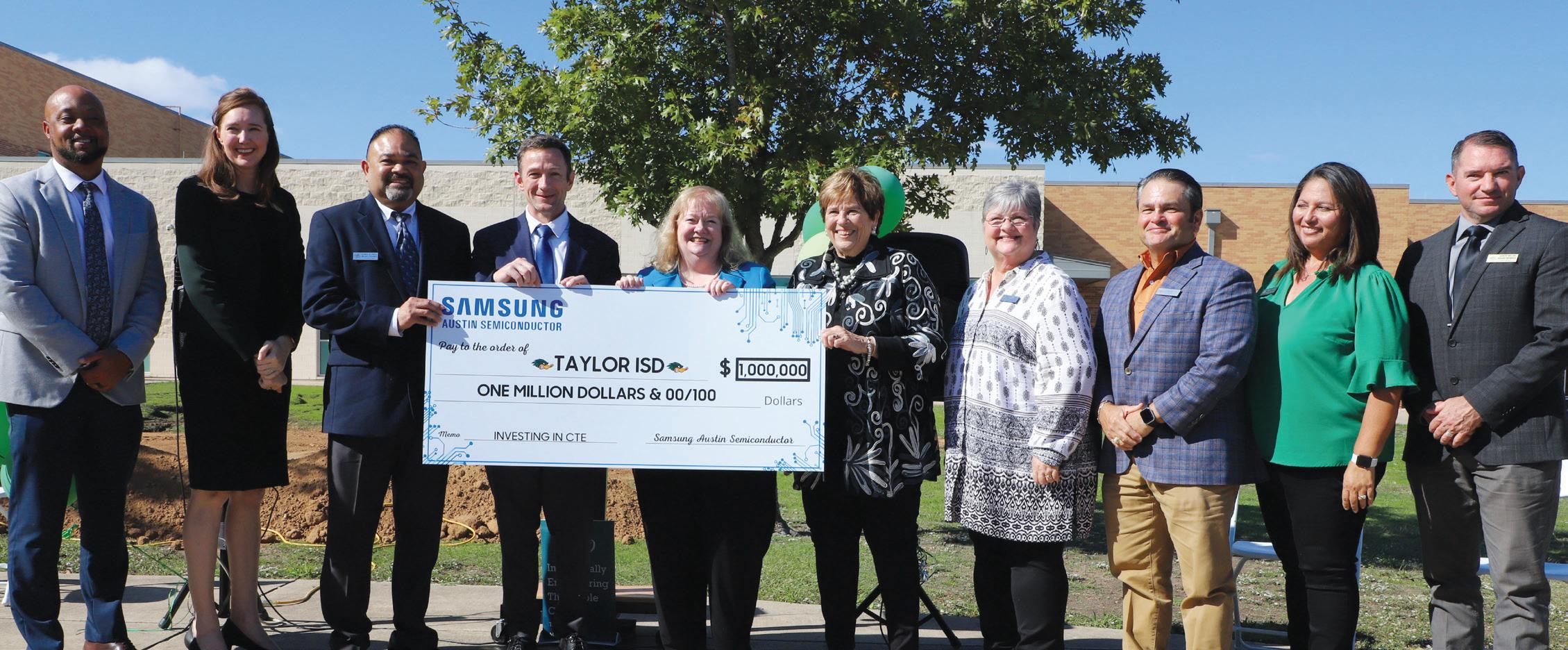
he said. “Families have been here for generations. One thing I’ve been impressed with is the respect Samsung has for that, and their willingness to learn that community pride as they’ve become a part of our community. They’re showing their support and that they want to be a part of it.”
Nowhere is Taylor ISD’s respect for tradition more evident than at the district’s annual homecoming event, which is always a highlight of the school
year. It attracts alumni from all classes to enjoy not only the football game but also breakfast, a parade, and inductions into the Duck Hall of Fame.
“Generations come back,” Crow said. “The oldest person to come back was 100. A lot are in their 90s. It shows that community pride and sense of family.”
For Ortiz, keeping the school district connected to its rich past will be essential as it plans its future.
He looks forward to more Taylor ISD graduates being able to stay in their hometown to pursue careers and raise families.
“That’s the way we’re going to hold on to that charm and small-town feel,” he said. “Because the foundation has been built, it’s going to stay.” H
Savanna Polasek is a staff writer for Texas Lone Star.
SAMSUNG’S TAYLOR CAMPUS BY THE NUMBERS

Source: Samsung 2023 Economic Report, Impact DataSource, Samsung News
issuu.com/tasb-org | June 2024 | 17
Samsung Corp. officials presented Taylor ISD leaders with a $1 million check at the groundbreaking for the district’s new Career & Technical Education wing.
Trustees work to maintain focus on students
HONOR BOARDS
by Mary Ann Lopez
Ask any trustee why they volunteer their time on their board, and they’ll tell you they are there to support students. While every school board keeps this mission in mind as they take on district business, some are making exceptional progress to ensure all students have opportunities to achieve.
These high-achieving boards are recognized every year when the Texas Association of School Administrators selects five outstanding school boards for their dedication and service, which has positively impacted Texas public school students.
In 2023, the TASA School Board Awards program named Corsicana, Crowley, Montgomery, Texas City, and Ysleta ISDs as honor board finalists. They were selected by a committee of Texas school superintendents, who based their decisions on criteria including support for educational performance, commitment to a code of ethics, and a board’s ability to work together in a supportive and harmonious manner. Corsicana ISD was chosen as the 2023 Outstanding School Board.
The committee acknowledged each district’s specific qualities, which made them stand out as deserving of being named honor board finalists. We talked with board leaders from some of these boards to learn what has made them successful.
Academic excellence
At El Paso’s Ysleta ISD, the committee said it was impressed with the board’s commitment to academic excellence and its focus on continuous improvement. Ysleta ISD Board President Cruz Ochoa acknowledged the hard work the board has undertaken to earn such recognition.
“As a board, we represent the will of our community to improve the outcomes for our students,” he said.
Most of the trustees have been on the board as long as the district’s superintendent, Xavier De La Torre, who joined Ysleta ISD in 2014, Ochoa said. During De La Torre’s tenure, the board never wavered from its vision for students, but unexpected events did have significant impacts.
“The Walmart massacre followed by an unprecedented interruption to teaching and learning in the form of a global pandemic have had devastating consequences on our district,” Ochoa said. “Notwithstanding, the board has insisted on a growth model that accelerates performance and achievement back to pre-pandemic times.”
To make academic strides, the board participated in vision-
ing processes that led to two distinct five-year strategic action plans, Ochoa said. These action plans helped the board maintain its focus on student academic achievement and growth, eliminating the achievement gap, and ensuring students are prepared for the future, meeting college, career, and military readiness standards. All of this data and the outcomes are tied to the superintendent’s evaluation, and data collected through district and campus scorecards are part of the evaluation instrument.
Ochoa also attributes the district’s success to the positive working relationship between the board and the superintendent. Unlike most districts that function as a team of eight, at Ysleta ISD, it’s more like a team of 20, he said. The board has full access to De La Torre’s senior level staff and administrators who make up the superintendent’s cabinet. This allows for quicker responses to the board, creating transparency and building trust.
That trust was strengthened after the 2019 Walmart shooting, he said.
“The Walmart shootings brought our community together, and our district made every effort to reassure our students and teachers of keeping faithful to our beliefs and principles,” Ochoa said. “This horrific incident brought grief and disillusion to many of our students. Working with outreach programs, our counselors and schools addressed any issues our students and teachers were very concerned with.”
At Ysleta ISD, the board is proud that it was able to have two separate bonds approved totaling nearly $1 billion, Ochoa
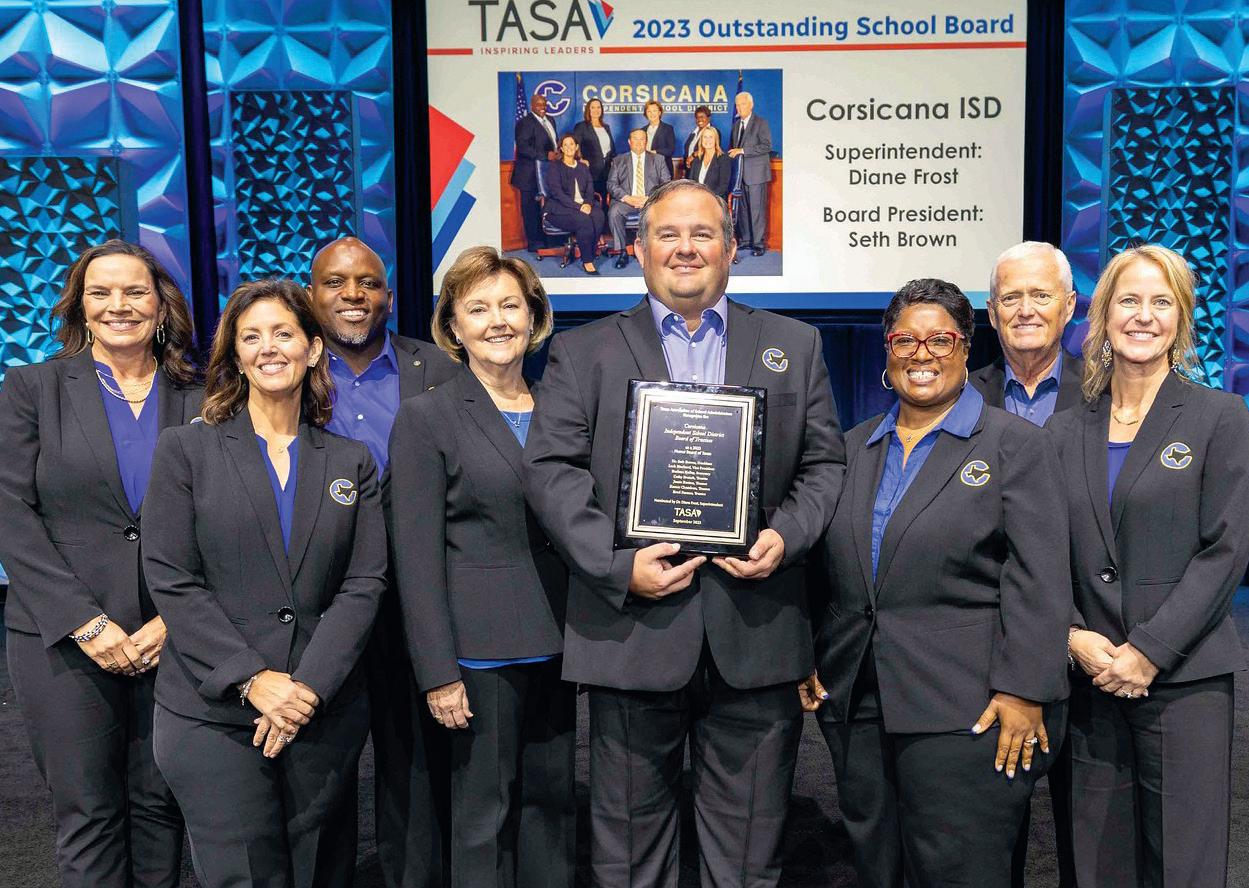
18 | June 2024 | issuu.com/tasb-org
The 2023 Outstanding School Board winner, Corsicana ISD, was announced at txEDCON23 in Dallas last fall by the Texas Association of School Administrators. Corsicana ISD trustees as well as members of the four honor board finalists were joined by their superintendents at the awards ceremony.

said. Those bonds provided students and staff with high-quality facilities, while also providing safety improvements including camera upgrades and safety vestibules in a majority of district buildings. The board is also proud of its status as a Texas Education Agency A-rated school district and a three-time recipient of the Best District in El Paso.
Being named an honor board finalist was a wonderful surprise, Ochoa said, adding that the board members agreed that they are just doing what they were elected to do.
“The board is cohesive and maintains a high level of expectations not only for us but also for our schools,” Ochoa said. “Our children’s education and safety are our highest priority.”
Collaborative spirit
At Montgomery ISD, about an hour northwest of Houston on Lake Conroe, the district has experienced a lot of growth, serving 9,748 students in an area that covers 217.89 miles, said Laurie Turner, board president.
“One of the things people move here for is the small-town feel,” Turner said. “You’re getting families, teachers, and administrators with high expectations for students. As an A-rated district, it makes for a great place to be.”
The TASA School Board Awards Committee was impressed with the Montgomery ISD board’s emphasis on academics and its ability to collaborate.
Turner has been on the board a little more than three years, and she said changes in the board membership, coupled with the hiring of the district’s new superintendent, have led to increased communication and collaboration.
“Who you hire as the superintendent has a huge impact,” Turner said. “A person that is driven has integrity, is a great communicator, and they are very dedicated to giving the same information to every board member. ... That role, the superintendent, can unify or even divide a board.”
Turner credited the district’s nominating superintendent, Keith Morrison, who left to serve as the CEO of Teachers for Tomorrow, with bringing the board, district staff, and community members together to share input on goals tied to the district’s strategic plan. That has helped drive the board’s work in support of student success, which trustees all agree is a priority. Turner said Morrison also helped improve communication and transparency within the district.
Among the achievements the board is most proud of is the
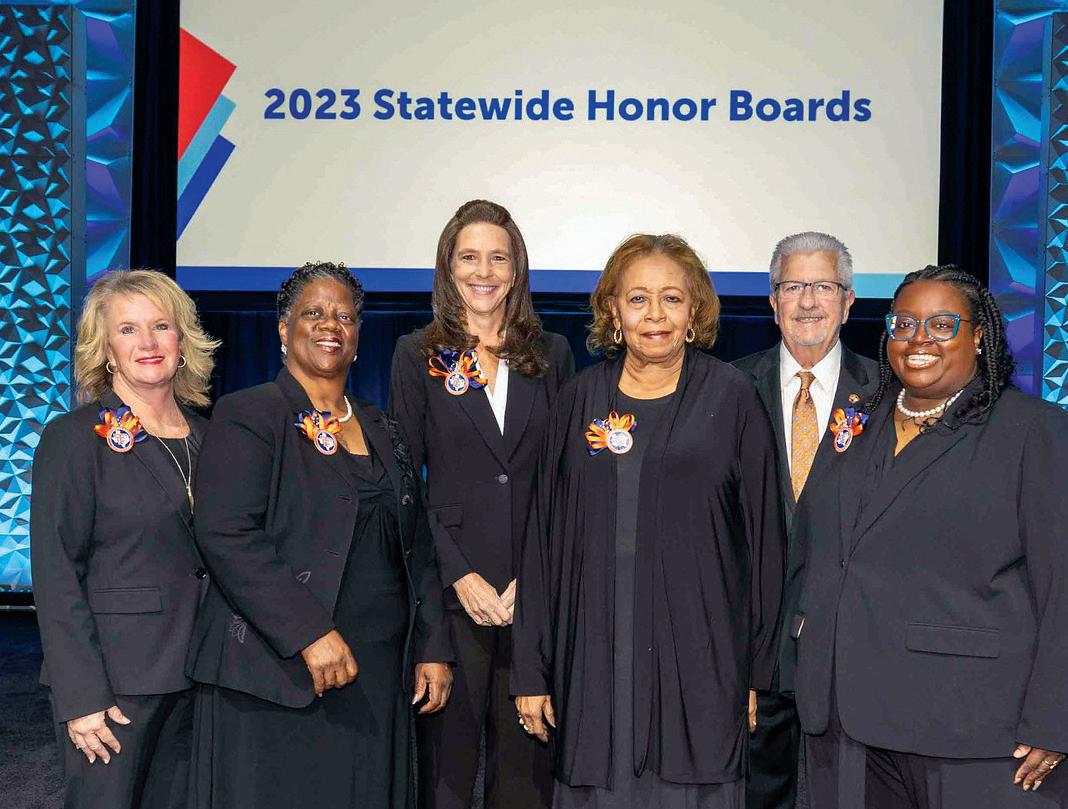
passage of a $326 million bond to support the construction of a new career and technical education center and an agriculture barn. Some of the funds, $5.4 million, were used to purchase devices for one-to-one teacher-student learning. The district has also been renovating some of its older buildings and making building upgrades on school campuses.
Being nominated as an honor board finalist was “something completely new for our district and exciting for our district,” Turner said.
Working collaboratively takes effort, and Turner said the board members are committed to the effort as they keep student achievement top of mind.
“We have gone to SLI [Summer Leadership Institute] and that has been absolutely fabulous to take classes we each want to take,” Turner said. “Good boards — even though we’re in a small community and we know each other — have time to have meals together, learn how to communicate, and have a good working relationship. We want to be hands on. We show up. We’re visible and constantly being invited to events in the district. ... We are represented at so many things throughout the district that brings us together as well.”
Student focused
The Corsicana ISD school board was awarded the 2023 Outstanding School Board during txEDCON23 last September.
issuu.com/tasb-org | June 2024 | 19
Pictured clockwise starting at the top left page are: Corsicana ISD’s school board, Crowley ISD’s school board, Montgomery ISD’s school board, Ysleta ISD’s school board, and Texas City ISD’s school board.
TASB Media Services
Photos by
Texas City ISD board members from left: Lori Carnes, Board President Melba Anderson, Superintendent Melissa Duarte, Mable Pratt, David Moss, and Nakisha Paul.
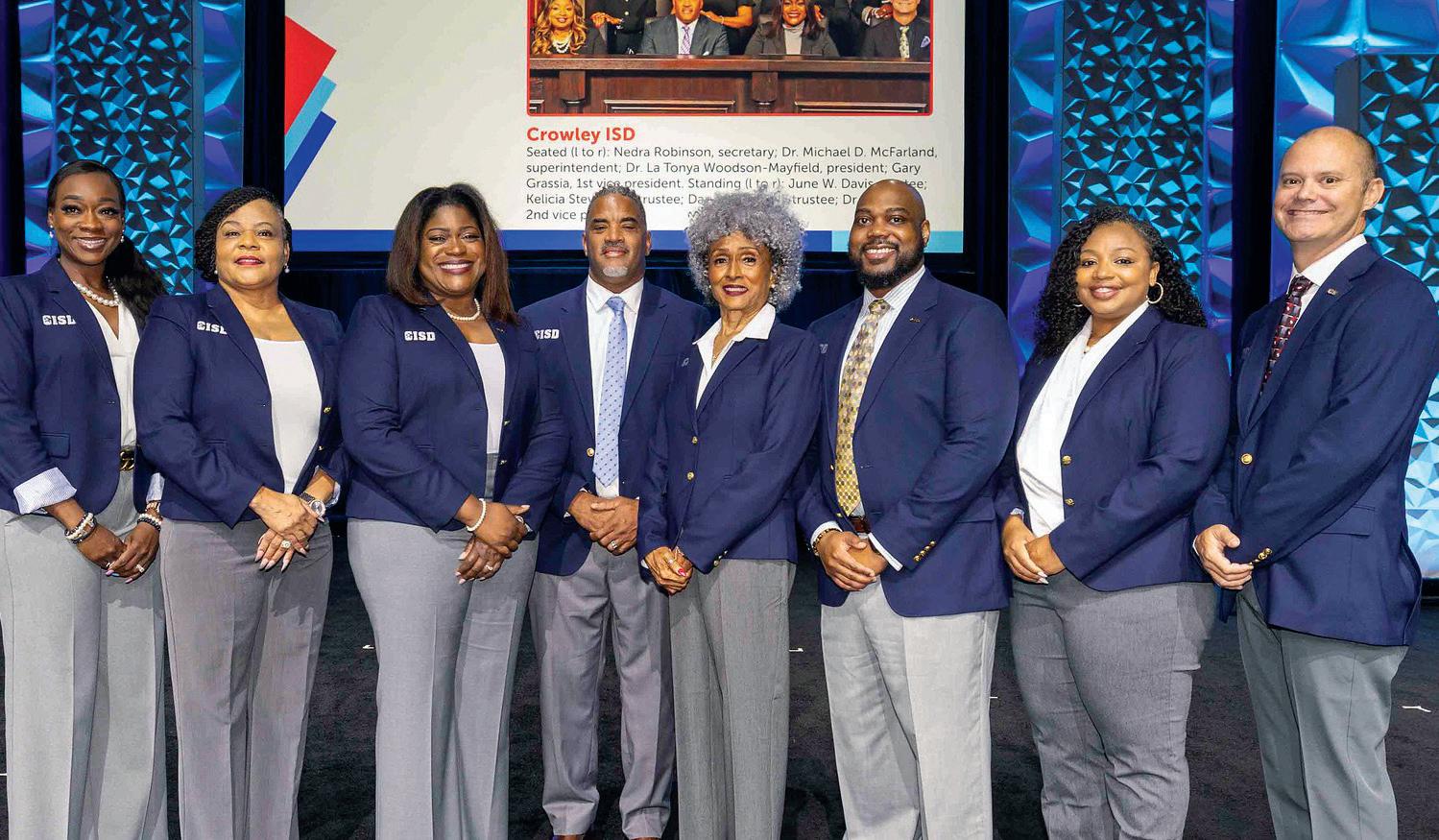
The district is located in Corsicana, a town of about 25,000 residents about 50 miles south of Dallas.
The selection committee said it was impressed with the Corsicana ISD board’s focus on the whole child as well as the trustees’ commitment to their community and advocacy for students on the local, state, and federal levels. Along with being committed to children, the committee described the Corsicana ISD board as “innovative, creative, and forwardthinking,” saying that they “embody the concept of the team of eight.”
When it comes to being forward-thinking, Seth Brown, the Corsicana ISD board president said the board has taken steps to ensure student safety. Even before he was on the board — Brown’s been a trustee for five years — and before it was state mandated, the district added armed guards and weapon detectors at every school, along with ensuring that schools had secured entry vestibules, he said.
“We’ve tried to stay ahead,” he said. “We want to ensure students are safe and secure and that parents know their children are safe.”
The board has also been very thoughtful about doing what is best for students.
To support all students’ needs, the district partnered with Head Start to offer an early-childhood education program at the Carroll Early Learning Center at Carroll Elementary School, longtime Corsicana ISD board member Barbara Kelley said. The program, geared toward young children from low-income families, supports child development, getting children up to speed, and building a love of learning at an early age, she said. The district also offers a pre-K dual-language program and a preschool program for children with disabilities.
The trustees shared that residents have a deep and abiding love for their town. Even when students move away for college or to start careers, they often return when they begin raising children. That connection to Corsicana is a motivating force for the trustees who continue to put in the time — not only for board meetings, but also for team-of-eight training, advocacy work for the district, attending school events, and volunteering with other local community organizations.
“I really love my community. I love serving. I’m a servant leader first,” Kelley said. “Anything I can do to better my community I want to do. ... It’s just a joy when you see those grad-
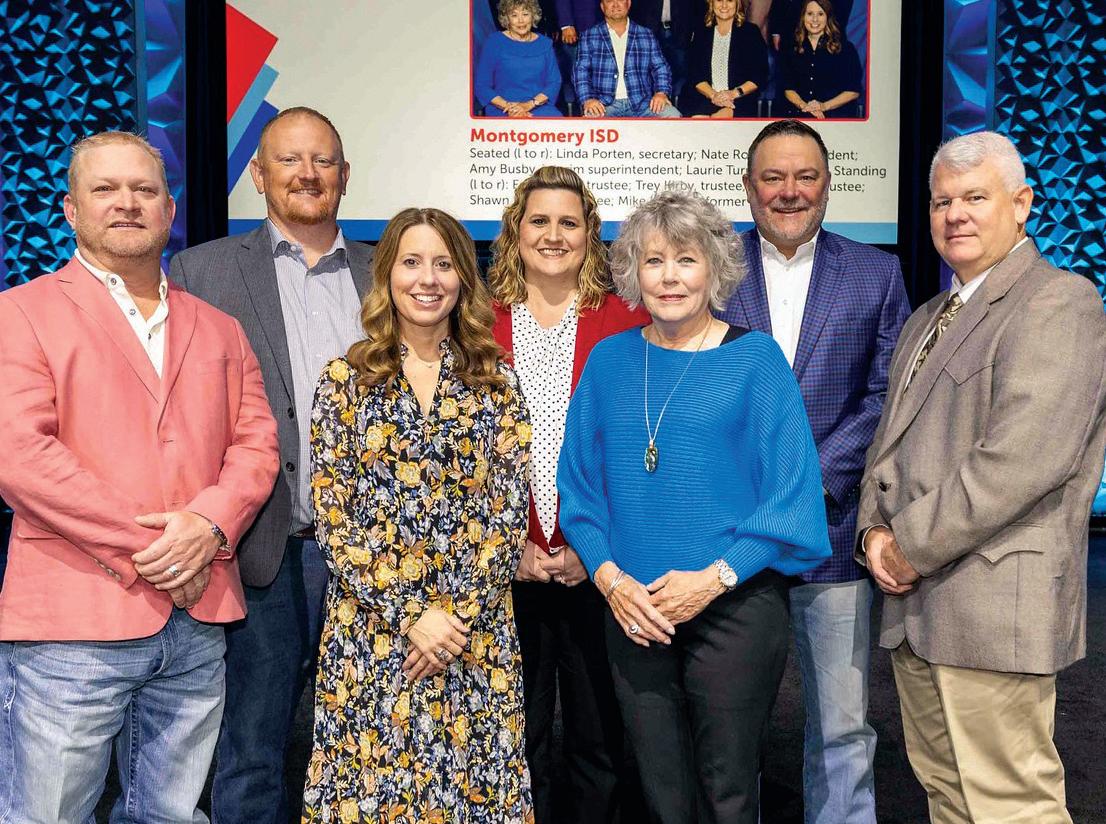
uates walk across the stage; it’s that completion. They’re going out into the world, and hopefully we’ve done a good job.”
Continuous improvement
For the Crowley ISD board, being selected as an honor board finalist was a humbling experience, said La Tonya WoodsonMayfield, the board president. This was the second time the Crowley ISD board was honored. It was also named an honor board finalist in 2001.
“Each one of us gives a great deal of time, energy, and resources to help govern the district, and work in lock step with [Superintendent] Dr. [Michael] McFarland to set and achieve goals,” she said. “But the ultimate reward is seeing the smiles on our students’ faces after they’ve participated in, and in most cases, won a competition, or when they’ve received a standing ovation at the end of a program, or after [they have] successfully demonstrated a project. Those are priceless moments, and it makes our roles as board trustees even more endearing. It’s a heart mission for sure.”
Located just south of Fort Worth, Crowley ISD has 26 schools and serves more than 16,500 students from Crowley and portions of Johnson County, according to the district. The district has a student-centric focus on excellence in education, Woodson-Mayfield said. It provides many support services for its students and their families, including breakfasts and lunches, after-school educational enrichment programs, health and counseling services, and extracurricular activities for our students, and parent university sessions and school and district updates for parents, among other services.
In its announcement, the TASA selection committee said the board’s focus on continuous improvement and innovation was impressive. Woodson-Mayfield has been on the board for seven years, and early in her board service, the district underwent a massive curriculum audit that made, and is still making, a positive impact for students, she said.
The district has made other innovative changes, including expanding its programs of choice and offering STEM Plus at every campus, allowing students to experience STEM programs for their grade level. The STEM Plus program focuses on student learning through applications of cultural relevance, collaboration, engineering design process, and communication skills, according to the district’s website.
20 | June 2024 | issuu.com/tasb-org
Crowley ISD board members from left: Mia Hall, Kelicia Stevenson, Board President La Tonya Woodson-Mayfield, Superintendent Michael D. McFarland, June W. Davis, Daryl R. Davis, II, Nedra Robinson, and Gary Grassia.
Montgomery ISD board members from left: Nate Robb, Matt Fuller, Board President Laurie Turner, Interim Superintendent Amy Busby, Linda Porten, Trey Kirby, and Shawn Denison.
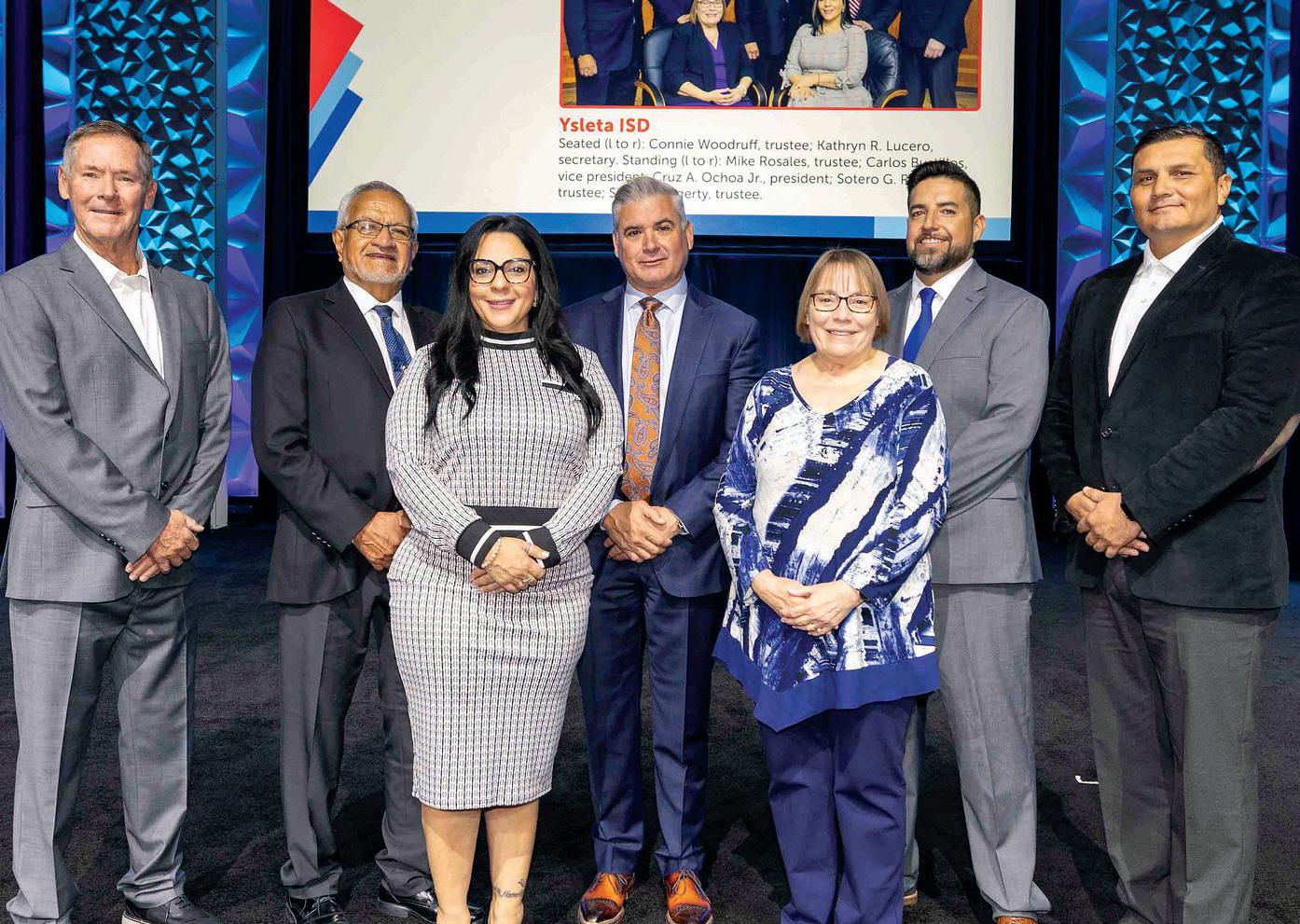
“The expansion of choice programs gives our students a wider lens and greater depth of career choices that will benefit them and our communities,” Woodson-Mayfield said. “We also extended the school year at ADSY (Additional Days School Year) campuses. As a result, David L. Walker Elementary, for example, went from the lowest performing school to the highest performing school.”
Being recognized as an honor board finalist gave the board a jolt of energy and motivation to stay on course, WoodsonMayfield said.
“Staying on course doesn’t mean doing the same thing again,” she said. “It means continuing our process of learning, being engaged, challenging processes and ways of thinking and doing, setting higher standards, and growing together and bonding. We’re very thankful for the accomplishment and we’ll continue pushing the envelope of excellence.”
Culture and experience
Located in Galveston County, Texas City ISD serves about 7,800 students from La Marque and Texas City. The district blends the best of both worlds, offering a small-town atmosphere with resources and opportunities for students that might normally be found in a larger city, said Texas City ISD Board President Melba Anderson. “This unique combination allows students to benefit from a close-knit community while also preparing them for success in a diverse and dynamic world.”
A trustee at the district for 23 years, Anderson has served four terms as president, this being her most recent tenure. She said the Texas City ISD trustees were surprised and honored to be selected as an honor board finalist.
“Our board has worked tirelessly, facing challenges head-on and leveraging our collective strengths to serve our students, staff, and community to the best of our abilities,” Anderson said. “We knew that our efforts had not gone unnoticed, but receiving this recognition reaffirmed the impact of our hard work and dedication.”
In her nomination, Texas City ISD Superintendent Melissa Duarte said the board offered a cultural and experience mix and that those perspectives had strengthened the board’s “capacity to represent a growing and culturally diverse community in a district with a rich legacy.”
At Texas City ISD, Anderson said, each trustee brings a
Find out which school board will be named the 2024 Outstanding School Board during txEDCON24, being held Sept. 27-29 at the Henry B. González Convention Center in San Antonio. Learn more at tasa.tasb.org.
unique cultural perspective to the table, leading to a better understanding of and support for the needs of students from different backgrounds.
“Overall, the board’ s commitment to leveraging its differences and experiences reflects a dedication to ensuring that every student in the district has access to an equitable and enriching educational experience,” Anderson said. “By valuing diversity and embracing inclusion, the board plays a pivotal role in fostering a positive and supportive learning environment that empowers students to reach their full potential.”
The TASA selection committee was impressed with the board’s spirit of cooperation and focus on students. Not only have the board members worked together to create regular communication channels, but they’ve also cultivated partnerships with local businesses, organizations, and educational institutions to enhance resources and opportunities for students, Anderson said.
“Through these efforts, we’ve built a culture of collaboration that strengthens our board’s effectiveness and positively impacts student outcomes,” she said.
Anderson said that some of the accomplishments that are a result of the board’s ongoing efforts include improved accountability results, an increase in CTE and industry certifications, creation of an Industrial Trades Signing Day, launching of the district’s Early College High School, the addition of a new leadership program for campuses, and implementation of Texas City ISD’s new dual-language program.
The board’s diligence was one reason Anderson believes it was recognized as an honor board finalist, but she said the board also stood out thanks to the unwavering support of their community, which resulted in the successful passage of two bond elections.
“These victories underscored the collective commitment to providing the best possible education for our students,” Anderson said. “The transformative impact of these investments was remarkable, as evidenced by the monumental shift from 42% to 100% of our schools achieving passing rates. This achievement reflects the board’s steadfast determination and strategic vision, ensuring that every student in our district has access to quality education and the opportunity to thrive.”H
Mary Ann Lopez is a staff writer for Texas Lone Star
issuu.com/tasb-org | June 2024 | 21
Photos by TASB Media Services
Ysleta ISD board members from left: Mike Dwyer, Board President Cruz Ochoa, Kathryn R. Lucero, Superintendent Xavier De La Torre, Connie Woodruff, Chris Hernandez, and Carlos Bustillos.
A HISTORY OFService

In his 25 years of service on the Northside ISD school board, Bobby Blount’s commitment to public schools has never wavered.
Blount, who also serves as president of the Texas Caucus of Black School Board Members, is this year’s recipient of the James B. Crow Innovation in Governance Award, which is presented to honorees who have shown a dedication to improving Texas public education. The award was established in 2022 in honor of its namesake, who retired as executive director of TASB in August 2021 after 40 years of service to the Association. Blount will formally receive the award at this year’s Summer Leadership Institute in June.
As a longstanding advocate of public schools, Blount is known for his leadership in the San Antonio education community. A former TASB Board member and a Leadership TASB alumni, he has also held notable positions at the Bexar County School Board Coalition, the Go Public Campaign, and the San Antonio Area African American Community Fund.
TASB sat down with Blount to discuss his long history of public school leadership and how board members can stay focused and inspired.
What inspires you to keep serving on the Northside ISD school board after 25 years?
Working with the kids. Every day there’s a new kid to support and a new way to be successful. Especially when you start having personal interactions with the kids, you begin to develop a love for this kind of work, and you start to notice more things you can do for them.
James B. Crow Award winner shares inspiration
by Leslie Trahan
Since education has been around, there have always been challenges. There’s always somebody that needs additional help or an additional boost, whether it be over the last five years or the 20 years prior to that. But if you focus on trying to make those kids successful, that’s the one constant that we can always bring.
What advice do you have for new school board members?
Keep your eye on the ball. There are a lot of distractions. A lot of things can take you off focus and cause you to start losing ground. You have to say, “No matter what’s going on around me, I’m going to stay focused on those kids and let everything else be noise.” I think that’s the best way you can be successful.
It’s also important for people coming on the school boards to understand that you have to be willing to work as a team. The team includes your other board members and the community. Single issues are distracting right now. But if you want to make a difference, you have to think about how to sustain your achievements over the long term.
How do you build relationships with new team members once you get on the board?
Building relationships not only with your own team but also with the superintendent and with staff, too, is really important. When it comes to the team itself, being honest and having dialogues with each other is key. You have to be willing to learn how individual team members prefer to communicate and use that to build connections.
At Northside, we have a strong culture, and we try to make
22 | June 2024 | issuu.com/tasb-org
Bobby Blount high fives students from three of the winning teams, out of the over 300 that competed, at a Northside ISD Solar Car Race event.
sure that culture is maintained. We meet with past superintendents and trustees for an annual luncheon. Those types of things are very important, and it’s something that has always been strong with the Northside school board.
You’ve run a lot of successful campaigns over the years. Do you have tips on campaigning?
The first thing I can say is that raising money has become critical for campaigning, and you need a strong election team in place. We’ve learned the importance of, for example, sending out early mailers. You have to treat it like a major political campaign.
Another thing is to make sure you have a clear understanding of who you’re running against and what their position is. That doesn’t mean you have to be against them, but just understand where they’re coming from and be able to explain what your focus is. Be prepared for how they may take jabs against you based on their position.
The third thing I always advise is to bond with the district as much as possible. Be on different committees and be a leader as opposed to coming on totally new.
My last tip is to avoid aligning yourself with any group. Try to be neutral as much as possible, as least coming in. People like to talk about what party they’re in – Republican Party, Democratic Party. I say I’m on the Student Party. Whatever students need, that’s where I’m at.
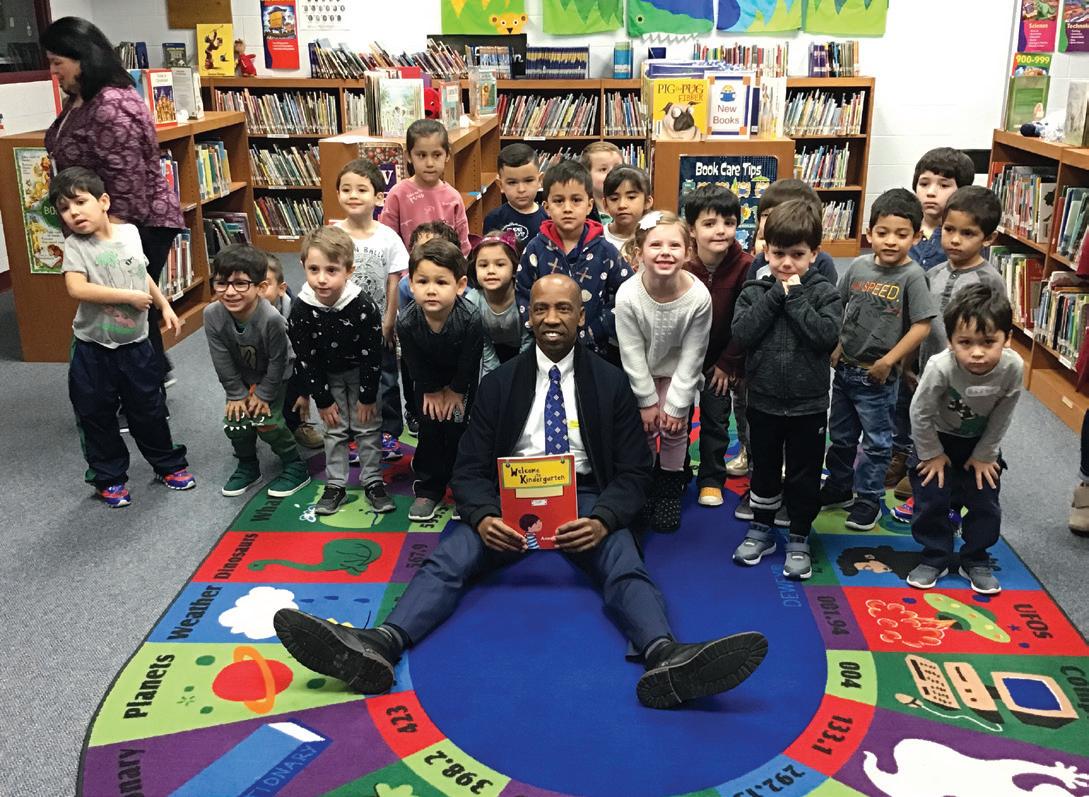
Can you share a little about your work as president of the Texas Caucus of Black School Board Members? What have you been working on during your time there?
About 15 years ago, during a Summer Leadership Institute and some other forums across the state, we started looking at the achievement gap. We know the data across Texas, across the nation, across the world. We’re really trying to work now on actual solutions.
We’ve started a strategy that developed over time, where we ask what areas we can focus on to help out any group that may not be performing as well. We identified reading, attendance, discipline, and rigor. If you just focus on those particular areas, you’ re going to help move a group forward. So now we’ re in the middle of sharing what we’ve learned.
I take great pride that the Caucus has taken something that we started years ago and built it up in a way that can benefit the whole state.
What else do you think board members need to be aware of as we look toward the future for Texas public schools?
I think it’s very important that we take pride in the work we’re doing and remember that we can’t let people blame education for other problems in society. There are other challenges. People aren’t afraid to point out when there are problems in education, but we need to look at the full picture.
For example, through my chair of the San Antonio Area African American Community Fund, we did a two-year study of demographics in the San Antonio area. We looked at education, we looked at health, we looked at housing, we looked at population, we looked at everything.
We gathered all the data, and we did a comparison between the different demographic groups. At least for San Antonio, what we found is that the primary determination of the potential to be successful was housing because where you live determines your health and environment. It also determines your school and education background, and it determines whether you can start in business, whether you have enough wealth in your home to get access to capital.
You obviously have a lot on your plate. How do you make time for everything?
You don’t think about the work, you just do it. If you think about it, you spend all your time talking about it as opposed to doing it.
I will say that it’s also important to find ways to institutionalize things. I founded the Northside Solar Car Races, which is a science enrichment program for elementary students, and in the first four years, it was me and a couple of others working on it. Now we’re over a thousand kids every year, but it’s a district program. Northside Science helps run that. With whatever I’m doing, I try to find ways to get it institutionalized, so that even if my name is associated with starting it, it’s actually others who are helping to make it happen. Somebody else is putting in the resources to make it successful.
Is there anything else you'd like to share with TASB members?
I’m very appreciative of the San Antonio community. We’ve been very fortunate that our trustees here, through our Bexar County School Board Coalition and other things, we’re very close to each other and very supportive of each other. I can call them any time of the day and we can begin to look at things. I’ve built relationships with the local districts. Thanks to my TASB involvement, I have built relationships with trustees across the state. Through working with other trustees, I know we all have great stories to tell and just need to tell them.
I’m also very thankful to Jim Crow. I was fortunate to get to work with him on so many different things over the years. It’s an honor to receive this award named after him.H
Leslie Trahan is a staff writer for Texas Lone Star.
issuu.com/tasb-org | June 2024 | 23
Bobby Blount reads to and emphasizes the importance of reading to students at a Northside ISD elementary school. Photos courtesy of Northside ISD
Library Collections
New state guidelines bring policy updates
by Joy Baskin
Among the items on a school board’s to-do list this summer may be approving a library collection development policy that describes the processes and standards by which a school library acquires, maintains, and withdraws materials.
Such a local policy became required after the Texas Legislature passed the “READER Act” in House Bill 900 in 2023. The new law required the Texas State Library and Archives Commission (TSLAC), with initial approval by the Texas State Board of Education, to adopt school library collection development standards for Texas public schools.
Those standards became available in January 2024, and they now appear in Texas Administrative Code section 4.2. With these standards in place, many boards will now be looking at how to comply with all legal requirements while developing and implementing library collection development policies and related administrative procedures.
What do the new standards do?
The new standards set collection goals, establish standards for evaluating potential materials, encourage parental involvement and transparency, and provide for reconsideration of materials upon request of a district parent or employee.
How do these standards impact district policies?
The standards provide a baseline for districts to develop their policies. Districts may customize their policies to meet local expectations and needs as long as any added procedures do not conflict with the minimum requirements in the standards. TSLAC’s website offers an implementation checklist, FAQ, and resources for librarians and school administrators.
Do the standards apply to classroom libraries? How is a classroom library defined?
Yes. For the first time, classroom libraries are included in the TSLAC col-
Classroom collections must follow TSLAC standards, but schools do not have to implement the standards for classrooms exactly the same as for campus libraries.
This summer, TASB Policy Service will release Update 123 to include the updated EFA series on instructional materials and the updated EFB series on library materials.
In the meantime, here are some Frequently Asked Questions to help school boards understand the policy implications:
lection standards. Classroom libraries are individual teachers’ classroom collections available for student self-selection, not materials assigned as part of classroom instruction.
Classroom collections must follow TSLAC standards, but schools do not have to implement the standards for classrooms exactly the same as for campus libraries.

For example, the standards require districts to have a plan that allows efficient parental access to what is included in a library. For a classroom collection, simply listing the books on the teacher’s website would provide efficient parental access. The law and standards do not require classroom library materials to be included in the district’s school library catalog.
What should boards know about updating their policies?
First of all, the state standards are current law and in effect even if local school board policy is not yet updated.
Of course, TASB Policy Service has resources ready to support your district through these changes. The majority of school districts currently have policy EF(LOCAL), which covers both instructional materials and library materials. TASB has divided this policy into EFA(LOCAL) addressing instructional materials and EFB(LOCAL) addressing library materials.
Updated policy recommendations will arrive with Update 123, which started arriving in districts in May. As always, a school board may adopt local policies that reflect local needs and choices, within the bounds of the law. TASB’s model local policies are always just a starting place for your board’s consideration.
Is there any litigation that could impact local policy on HB 900?
Although there has been related
24 | June 2024 | issuu.com/tasb-org Legal News

litigation, the only aspect of HB 900 that’s been impacted is the portion of the law that requires book vendors to rate library books as sexually explicit or sexually relevant. The Fifth Circuit Court of Appeals upheld a preliminary injunction that blocks these ratings. But this injunction does not affect the new collection development standards as a whole. Districts are still required to institute a collection development policy addressing the minimum standards in the rule.
Do the collection standards limit student access to certain materials?
The original collection standards required districts to determine a process to administer student access to material rated “sexually relevant” by vendors and to prohibit access to materials rated “sexually explicit” by vendors. However, because of the court ruling blocking vendor ratings, these provisions are not in effect.
The standards also prohibit the possession, acquisition, and purchase of harmful material, as defined by Texas Penal Code section 43.24, and library material that is pervasively vulgar or educationally unsuitable as referenced in Board of Education v. Pico, 457 U.S. 853 (1982).
Under state law, harmful material means material whose dominant theme, taken as a whole, appeals to the prurient interest of a minor, in sex, nudity, or excretion; is patently offensive to prevailing standards in the adult community as a whole with respect to what is suitable for
Updated policy recommendations will arrive with Update 123, which started arriving in districts in May. As always, a school board may adopt local policies that reflect local needs and choices, within the bounds of the law.
minors; and is utterly without redeeming social value for minors.
Any considerations for districts with dual credit programs where students have access to community college libraries?
The new law and standards do not apply to community college libraries and do not address dual credit students. If your district provides dual credit opportunities that would allow access to college library resources, work with your school attorney to confirm this is addressed in your agreement with the college, and parents are aware and have agreed for their students to participate in the program. Similarly, the collection development standards do not address partnerships between school districts and public libraries. School districts should inform parents that the standards do not apply outside the public school setting.H
Joy Baskin is associate executive director of Policy and Legal Services and education counsel at TASB.
Questions About the Texas Open Meetings Act?

This article is provided for educational purposes and contains information to facilitate a general understanding of the law. References to judicial or other official proceedings are intended to be a fair and impartial account of public records, which may contain allegations that are not true. This article is not an exhaustive treatment of the law, nor is it intended to substitute for the advice of an attorney. Consult your own attorney to apply these legal principles to specific fact situations. The School Official’s Guide to the Texas Open Meetings Act, 17th edition, provides
issuu.com/tasb-org | June 2024 | 25
a comprehensive explanation of the OMA and how it applies to school districts. Updated with changes from the 88th Legislative Session! To order, call 800-580-8272, ext. 3613 or visit store.tasb.org.
Legislative Interim
Lawmakers evaluate public ed issues before next session
by Dax González
There are signs of life over at the Texas Capitol, as legislators and staffers begin studying potential legislation for the next session in interim committee hearings. Lt. Gov. Dan Patrick released his interim charges for Senate committees back in April, and they include:
Education committee
Reading and math readiness: Study current local, state, and national policies and programs that improve student achievement in reading and mathematics, with an emphasis on “early readiness” in grades pre-K-5. Make recommendations to ensure every student has a strong academic foundation in reading and math.
Testing reform: Review the state’s current development and phase-in of the STAAR test redesign and ongoing innovative assessment reforms, including the Texas Through-Year Assessment Pilot. Recommend ways to accelerate current testing improvement efforts and the development of a real-time testing program that meets the educational needs of Texas students.
COVID-19 funding oversight: Examine and report on how public schools spent federal funds since the beginning of the COVID-19 pandemic, including funds received under the American Rescue Plan Act, with a dual focus on demonstrated improved student outcomes and efficient use of taxpayer funds.
Monitoring: Monitor the implementation of legislation addressed by the Senate Committee on Education passed by the 88th Legislature, as well as relevant agencies and programs under the committee’s jurisdiction. Specifically,
make recommendations for any legislation needed to improve, enhance, or complete implementation of the following:
• Measures ensuring public school safety
• Oversight of public school library procurement and content policies
• High-quality instructional materials and open-educational resources
Finance committee
Continue cutting property taxes: Identify the best combination to further increase the amount of homestead exemption and compression to continue cutting Texans’ property taxes. Additionally, establish and report on the cost of eliminating:
• School maintenance and operation property taxes
• All school property taxes
• All property taxes
Determine the fiscal consequences of each action, including whether revenue reallocations would be required for public education funding and local government funding, and impacts on the state’s ability to respond to disasters and other urgent priorities. For example, determine the effect on other state programs if general revenue were used to fully replace school property taxes, particularly during economic downturns. Evaluate and report on how much state revenue would need to be generated to replace foregone property tax revenue, and from what source.
Local government committee
Additional property tax relief and reform: Report on the effects of prior property tax relief and reform, including the $18 billion tax cut with the $100,000 homestead exemption authorized by the 88th Legislature. Focus particularly on the interaction between Senate Bill 2, the 88th Legislature, the second special session, Senate Bill 2, and the 86th Legislature. Make recommendations for further property tax relief and reform, including methods to improve voter control over tax rate setting and debt authorization, and mech-

26 | June 2024 | issuu.com/tasb-org Capitol Watch
anisms to dissolve taxing entities such as municipal management districts and tax increment reinvestment zones when they have outlived their purpose.
Business and commerce committee
Addressing the rising cost of insurance: Assess the impact of rising property and casualty insurance costs on Texas property owners, real estate lenders, and commercial and industrial development. Identify ways to increase consumer transparency to better inform coverage decisions and make recommendations to ensure a competitive and affordable insurance market for consumers.
While Patrick did not include a charge regarding vouchers, he did say, “Come January 2025, the Senate will hit the ground running at the start of the 89th Legislative Session. The priorities of the conservative majority of Texans will be accomplished, including school choice, continued property tax relief, and strengthening the power grid.”
The House was expected to post its interim charges in late April but had not by the time this column was written.
News from TASB
On the TASB front, make sure to check out our new school finance position paper that addresses myths about school funding for Texas public schools. It has data-supported responses to claims that Texas is fully funding education, that Texas public education is being funded at its highest level ever, and Texas public schools need to spend funds more wisely. Find the position paper by logging in to tasb.org and doing a search for Truth About School Finance.
The TASB Governmental Relations team also wants to give a big THANK YOU to all the boards that submitted advocacy resolutions this year. We received dozens of submissions from several districts. The TASB Board will review all submitted resolutions in July and make recommendations on their adoption to the Delegate Assembly in September. All adopted priorities and resolutions will form the 2024-2026 Advocacy Agenda, which will remain in effect until the end of the 2026 TASB Delegate Assembly. Learn more about Delegate Assembly by logging into tasb.org, going to About,
clicking on Governance, and then find Delegate Assembly at the bottom of that page.
I also want to welcome Kelly Rasti to TASB as the new associate executive director of Governmental Relations. Rasti joins TASB from Northside ISD, where she served as the executive director of Outreach and Advocacy for the San Antonio district of more than 100,000 students. Read more about Rasti on page 36.
Remember, TASB Governmental Relations staff is available to answer any questions you may have regarding advocacy, the Texas Legislature, or the TASB Advocacy Agenda. You may also message me at dax.gonzalez@tasb.org or call me at 800-580-4885 for more information.H
Dax González is division director of TASB Governmental Relations.
issuu.com/tasb-org | June 2024 | 27
We can’t wait to see you at SLI! Find all the details about both events at tasb.org/SLI . San Antonio June 12–15 Fort Worth June 19–22
Unsung Heroes
Substitute teachers critical for functioning schools
by Jennifer Barton
In education, the focus of support tends to be directly connected to teachers. However, substitute teachers — the unsung heroes of our schools — also need strong support to be highly effective in their role of keeping schools running when teachers are absent. They often fill long-term and vacant positions, providing a greater impact within the school.
Finding willing and competent substitute teachers is as challenging as finding highly qualified teachers. With continued staffing shortages, as well as schools facing the increased challenge of midyear resignations of teachers, the role of the substitute teacher has sparked ongoing discussions with district leaders on how to effectively recruit, retain, and compensate substitute teachers.
Substitute teacher experience
The challenge in finding substitute teachers often lies with the required duties and responsibilities, as well as the treatment and support given to the substitute teacher on any given day. The pay for the job can be low, depending on the assignment and the district in which the substitute serves. In addition, through exit interviews and internal surveys, substitute teachers often communicate unsatisfactory experiences due to weak or nonexistent support from campus administrators, lack of respect from students and staff, minimal training, and misalignment between the work required and adequate compensation.
Substitute teachers want to work on campuses where they feel supported, in-
Substitute Market Rates

cluded, and connected. They want respect and to be seen as critical members of the learning community. They also want to be paid fairly for their contributions to the school. In other words, substitute teachers want what any full-time employee wants — to be recognized for the value they bring to the campus and the job.
District leaders need to be intentional about how substitute teachers are viewed and support their critical role in a functioning classroom. Messaging is key to how substitute teachers are seen within the district, and the message starts with district leaders and administrators.
Strategies of support
The management of substitute teachers needs to be systems oriented. District leaders need to be intentional in their expectations for the treatment and support of substitute teachers and communicate these expectations to campus administrators and their staff. Leaders also need to voice the importance of adequate compensation, ensuring substitute teachers are paid fairly for the value they bring to the district.
One approach to supporting substitute teachers is to create a model that defines the vision, role, and expectations of substitute teachers in the district. The model should identify desirable characteristics of a quality substitute teacher that would then lead to creating actionable
28 | June 2024 | issuu.com/tasb-org HR Files
$350
$300 $250 $200 $150 $100 $50 $55 Non-Degreed Degreed Short-Term Assignment Long-Term Assignment Degreed Degreed-Certified Degreed-Certified $55 $65 $65 $65 $85 $90 $100 $110 $130 $165 $200 $295 $265 $339 $0 Minimum Median Maximum

steps to recruit, train, support, and retain substitutes throughout the year.
Another approach to supporting substitute teachers is to start with information gathering. District leaders can determine how substitute teachers are faring in their schools by acquiring anecdotal data that will help them determine if substitute teachers feel supported, have the tools for success, and believe they are compensated fairly.
Surveys are a great tool to use to determine areas of needed improvement. District HR departments can conduct small, focused interview sessions to gather information. How the information is used to create improvements is key to developing an actionable plan of support for substitute teachers.
A few questions district leaders can ask include:
• Is the role of the substitute teacher clearly defined, and are expectations at each campus consistent?
• Is current training adequate to help substitute teachers be successful across campuses and in a variety of classrooms?
• What additional areas of support are needed to build the skills of substitute teachers?
• Do substitute teachers feel welcomed and respected at campuses? Do they feel supported by campus administrators?
Let TASB Executive Search Services do the heavy lifting!
As the competition for outstanding, communityfocused leaders grows, our skilled and experienced team is ready to support your district’s search for a dedicated superintendent.
From start to finish, our search process is fully customizable, and includes:
Strategic planning
Guidance during the application process
Supportive advertising and recruitment
Streamlined interview, background check, and reference process
Integrated community outreach
Collaborative transition process
issuu.com/tasb-org | June 2024 | 29
Trusted help for a successful superintendent search executive.search@tasb.org • 800-580-8272
• Do substitute pay rates seem fair for the work conducted in the role? What other incentives could communicate how the district values substitute teachers?
Supporting substitute teachers in a proactive and positive way should be the mission and goal. Substitute teachers are critical in providing continuity of instruction in the teacher’s absence, and they help build student achievement and success over the year.
Compensating substitute teachers
Creating conditions where substitutes feel supported and valued will help districts recruit and retain quality substitute teachers. Providing support and respect are key factors. However, so are compensating and rewarding these critical employees for their work with district schools.
Market data for substitute teacher pay from the 2023-24 TASB salary survey is provided on page 28. The median enrollment for all districts is 1,912 students, with 544 participants representing school
districts of different enrollment sizes and types completing the survey. The minimum and maximum daily rates are provided, as well as the market median for each category.
Overall, the data reflects how dis-
TASB SHARS
tricts value degreed-certified substitutes, especially in long-term assignments. The data also shows very little variance between short- and long-term assignments for those individuals who are both nondegreed and degreed. Additionally, some districts in the state are paying competitively, while others aren’t.
Next steps
Districts struggling to find and keep substitute teachers may need to change current thinking. With intentionality and a systems-thinking approach, districts may find improved hiring and fill rates, as well the ability to hire quality candidates who bring experience and value to the classrooms they serve.
Having an open mindset and setting aside past assumptions may help districts find new ways to build a robust pool of qualified substitute teachers. Focusing on these critical employees may help not only the substitute teacher, but also the campuses and students they serve.H
Jennifer Barton is an HR and compensation consultant at TASB HR Services.

30 | June 2024 | issuu.com/tasb-org
All-inclusive Ser vice ▶ Designated account executive to coordinate your SHARS program ▶ SHARS Medicaid billing and cost report preparation ▶ Full access to SMART Solutions™️ documentation platform ▶ Free online and in-person training We do it all for you! 888-630-6606 tasb.org/school-medicaid
The management of substitute teachers needs to be systems oriented. District leaders need to be intentional in their expectations for the treatment and support of substitute teachers and communicate these expectations to campus administrators and their staff.

Through specialized schools; Head Start early childhood education; afterschool programs; school-based therapy services; and a scholastic art and writing awards program, HCDE makes a BIG impact on Harris County communities. See the Impact at HCDE-TEXAS.ORG/IMPACT
MAKING AN EVERYDAY IMPACT
LTASB Visits Houston
Class explores history and school culture
by Yvonne Johnson
LEADERSHIP TASB
Editor’s note: Leadership TASB is a unique board development program designed to take experienced board members to a new level of service and leadership by introducing them to a variety of issues, people, activities, and locations. These columns are written by class members and track the group’s progress.
The Leadership TASB Class of 2024 held its fourth session in the Houston area and observed leadership in motion at Katy and Fort Bend ISDs, visiting with superintendents and experienced board members and learning how they have navigated challenging situations to achieve success in the districts they serve.
Day one began with a warm welcome from Katy ISD Superintendent Ken
Gregorski and included a tour of Miller Career & Technology Center and Martha Raines Academy. According to Gregorski, Katy ISD provides more than a basic education; it offers a vast array of innovative programs for students and opportunities for unparalleled learning.
The Miller Career & Technology Center offers 21 programs, including a dental assisting classroom and a highly sought-after cybersecurity program to meet demanding needs in the field of technology.
The Katy ISD tour wrapped up at the Raines Academy, an alternative high school campus designed to assist at-risk students with meeting graduation requirements in a flexible setting that rivals a junior-college atmosphere. The campus is not run on a specific set of rules but on a culture centered around providing a variety of options to address students’
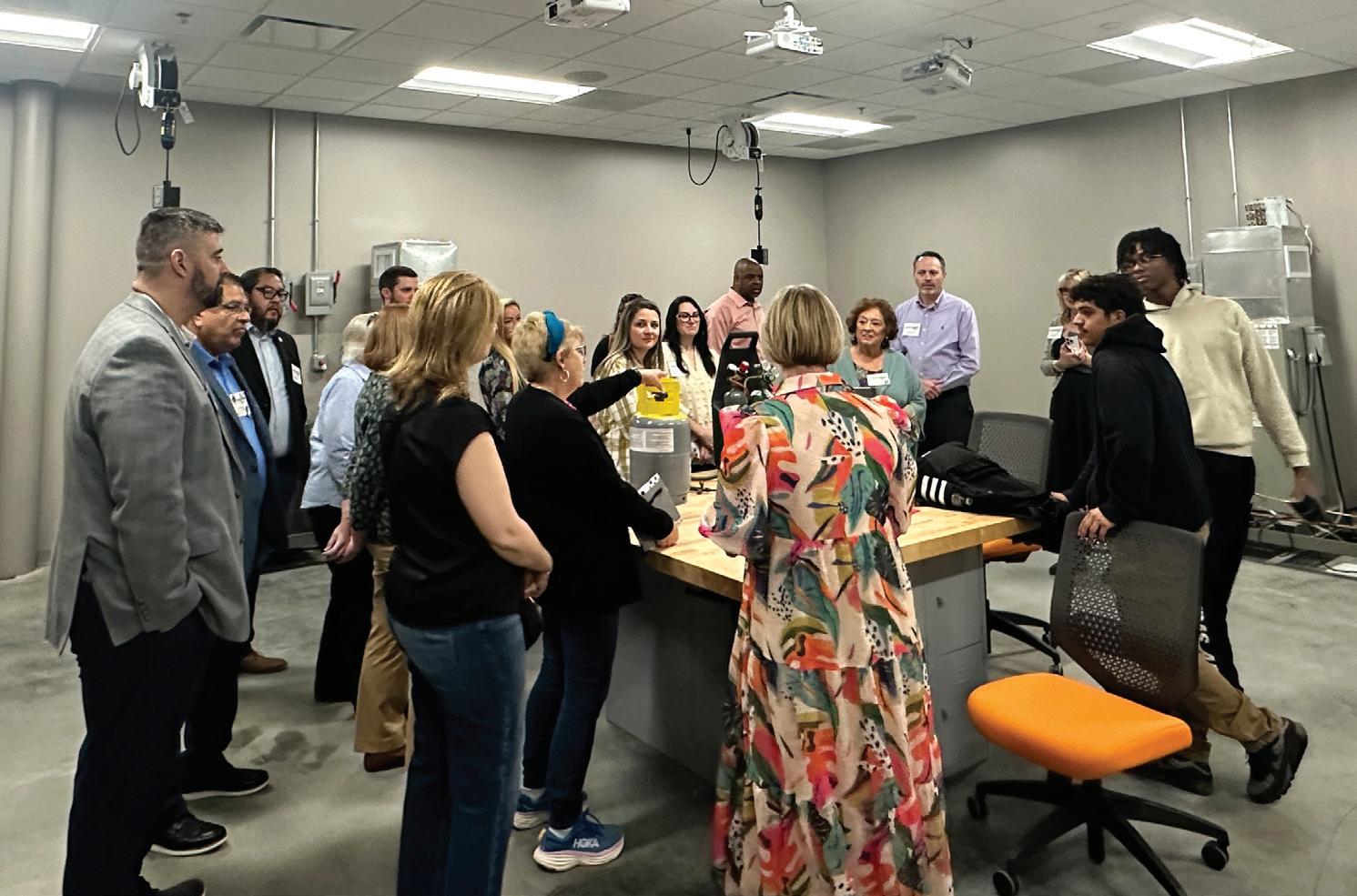
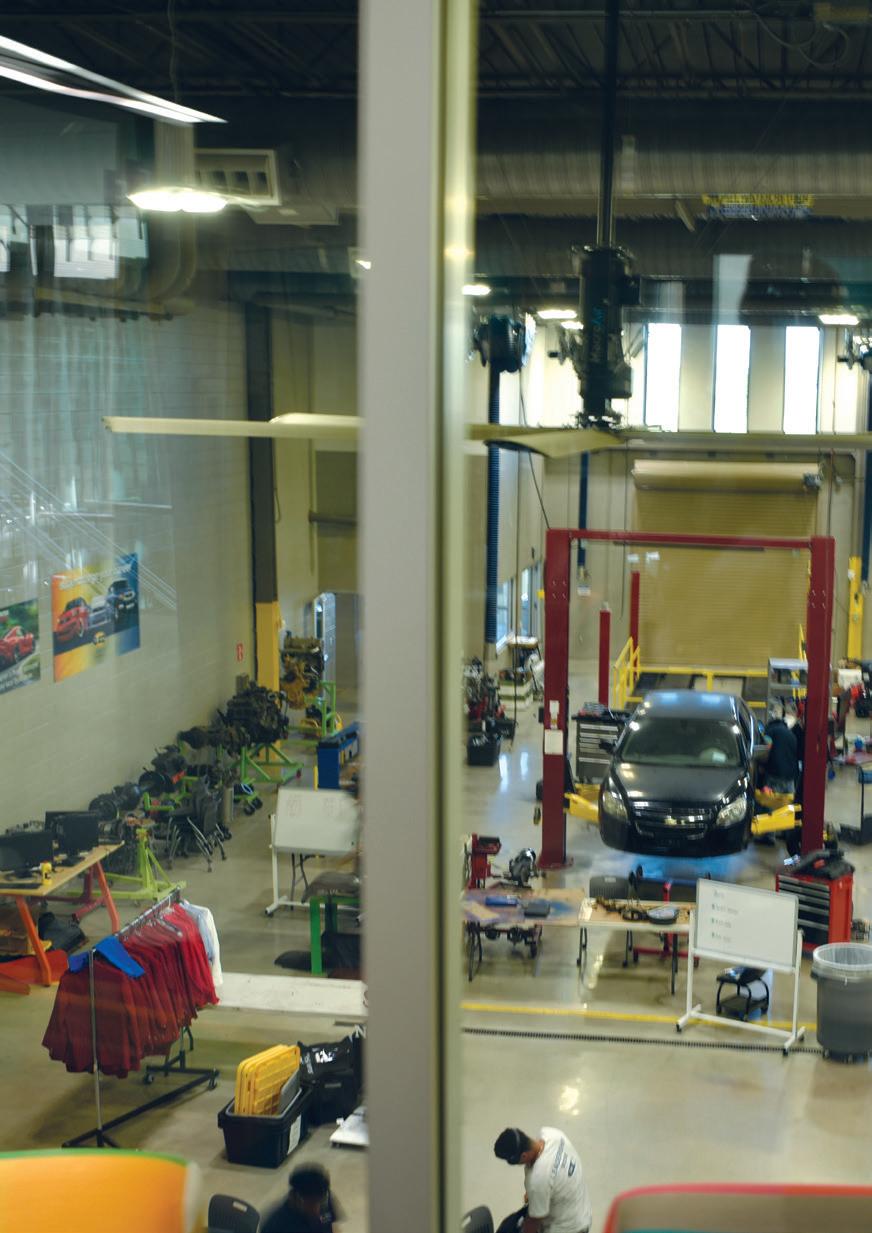
unique needs, according to the district. The school supports students who have struggled in a regular school setting but are successfully achieving their educational goals through the positive reinforcement provided at this campus.
The Raines Academy also provides lockers for homeless students to store their belongings. The school has a gym equipped with state-of-the-art equipment, providing a safe space for students to exercise.
In partnership with RGV CDL Services LLC, the academy also offers a pioneering program providing comprehensive training and hands-on learning for students to obtain commercial driver’s licenses.
After returning from Katy ISD, Darlene Breaux, an Alief ISD trustee who also serves on the TASB Board of Directors, shared the importance of civil discourse among board members and discussed the need for respectful conversation aimed at fostering understanding and constructive communication, allowing each member to share their own perspectives.
Roosevelt Nivens, superintendent at Lamar CISD, and Rick Kershner, superintendent at Royal ISD, spoke to the class about the challenges of a hypergrowth district and education funding.
The evening ended with the ABCs of
32 | June 2024 | issuu.com/tasb-org News & Events
Caption
At Fort Bend ISD, the LTASB Class of 2024 made a stop at the Reese Career & Technical Center’s automotive shop where students participating in the automotive technology program learn automotive basics and about small engines.
During the tour of Fort Bend ISD’s Reese Career & Technical Center, members of the LTASB Class of 2024 learn more about the school’s HVAC-RT (heating, ventilation, air conditioning, and refrigeration technology) program while observing some tools that are used during training.

communication strategies presented by Sheleah Reed, chief of staff at Aldine ISD and the author of Do You: The Audacity to Live a Bold and Authentic Life. She explained that board members are brand ambassadors and need to earn and maintain the community’s trust, so that when, not if, a crisis occurs the board is ready to take on the challenge.
Day two of the April trip began with a tour of the James Reese Career and Technical Center at Fort Bend ISD. Tours of each district’s CTE facilities served as a reminder that school choice is alive and well in public schools. Students and their families have options for college or career pathways to provide the best opportunities for students’ learning styles or educational preferences.
Tour of historic cemetery
The day also included a tour of the Sugar Land 95 site at Fort Bend ISD. In 2018, at the start of a construction project in the district, workers uncovered a historic cemetery where 95 African Americans were buried. They were thought to be a part of a convict-leasing program that started in the late 1800s.
Jason Burdine, former Fort Bend ISD board president, discussed challenges the district faced with the discovery of the unmarked cemetery and the unprece-
Hate paperwork? Us, too.
Paper costs have increased by double-digits in recent years, with lingering supply chain problems creating additional hassles for anyone who relies on paper for meeting packets. Those costs don’t include labor for a process that has traditionally involved:
• Ordering necessary supplies like paper, ink, binders, tabs
• Collating and assembling documents into a packet
• Arranging for delivery of your packets
That’s why we made BoardBook. Ditch the clutter and focus on what really matters.
Call 888-587-2665 or visit boardbook.org today to learn more.
issuu.com/tasb-org | June 2024 | 33
Photos courtesy of Chris Kovatch
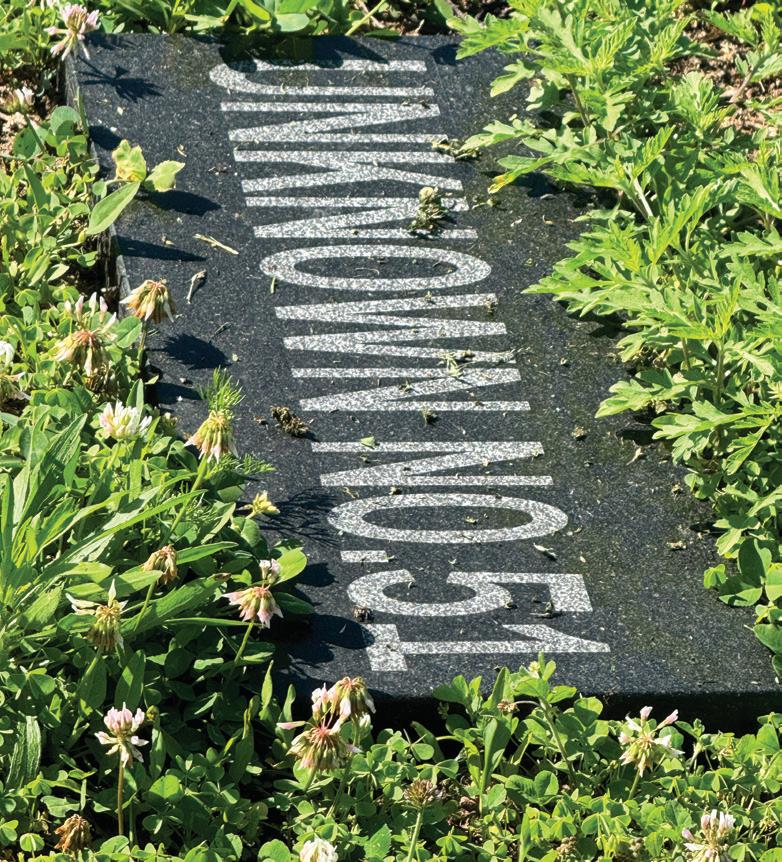
dented journey the district undertook to honor those individuals while also shedding light on the hidden history behind convict leasing. He explained that convict leasing was like a new form of slavery following the addition of the 13th Amendment to the U.S. Constitution, which abolished slavery and involuntary servitude.
The Fort Bend ISD board adopted a local policy to incorporate the Sugar Land 95 discovery into the district’s social studies curriculum to honor the lives and legacies of the Sugar Land 95 by providing educational opportunities and memorialization to make certain they were “found and not forgotten.”
Although the tour was an emotional journey for LTASB members, it offered a reminder that there are consequences of policy, including those approved by school boards.
The class rounded out the day with a presentation on personality traits and leadership communication from Klip Weaver and Jared McCurley of E3 Entegral Solutions and a presentation by Tony Hopkins, Friendswood ISD board president and TASB first vice president, about the Four-Ps of board leadership: purpose, prepared and engaged, passion to reignite the fire, and the importance of the president’s position as a facilitator of superintendent and board relations.H
Yvonne Johnson is the president of the Shepherd ISD board of managers and a member of the LTASB class of 2024.
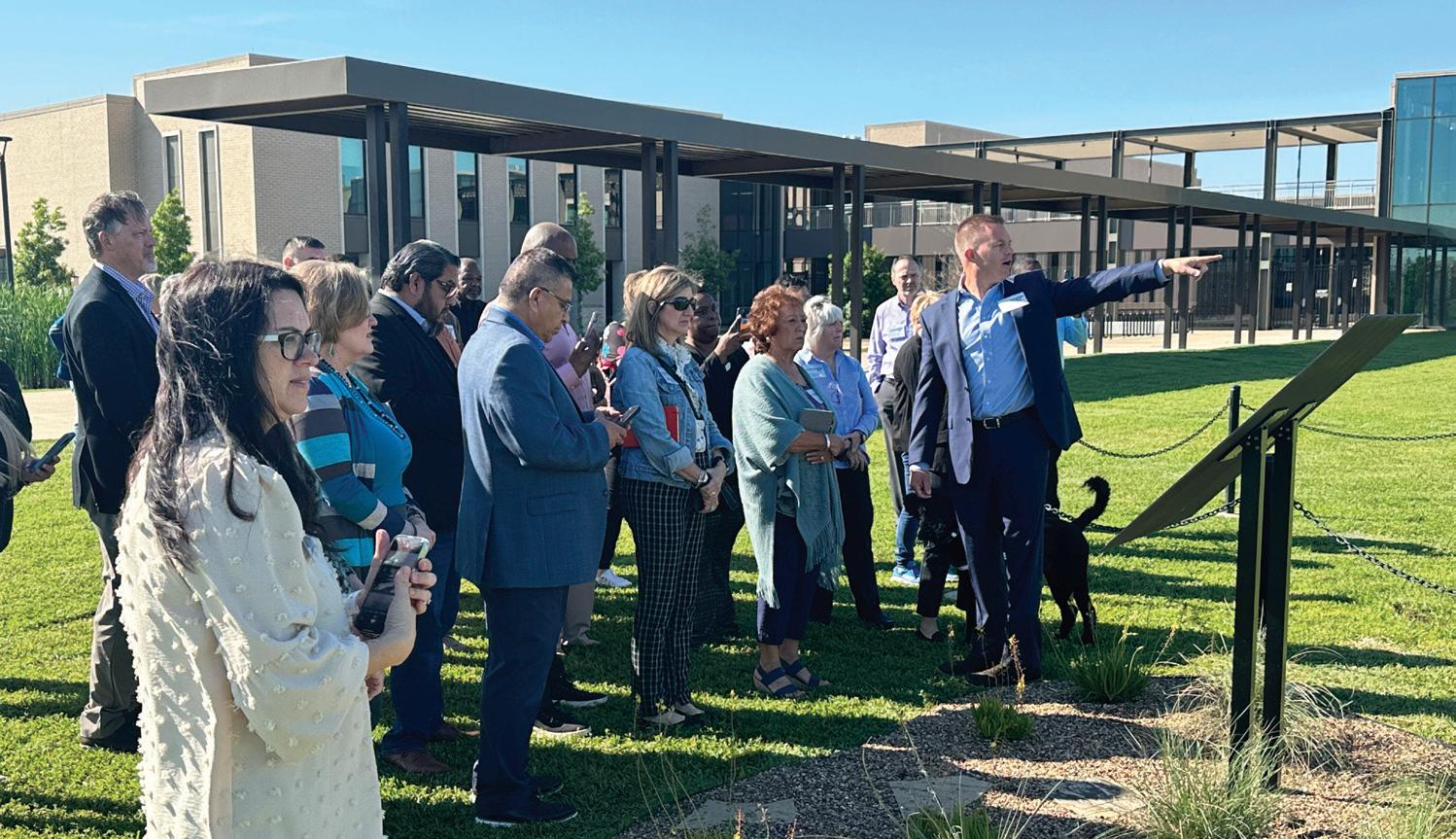
LTASB Applications Open
by Mary Ann Lopez
For Nicole Nolen, a trustee serving her first term at Gregory-Portland ISD, participating in the Leadership TASB Class of 2024 has changed how she approaches her board service, but the program’s importance doesn’t stop there.
“I cannot think of a single aspect of my life that it has not had an impact on,” Nolen said.
The LTASB application period is open for the upcoming LTASB Class of 2025. Nolen said she encourages any interested trustee to apply, regardless of the length of their service. The deadline to apply is July 1.
Nolen saw first-hand how beneficial the program was for other trustees on her board, and decided she wanted to gain access to resources and build a network of support that would help her navigate her board service.
Connecting with education leaders from across the state and creating long-standing relationships is a cornerstone of the LTASB program experience.
LTASB brings trustees together from districts of all sizes across the state who commit to the traditionally yearlong program. The program consists of five sessions, each lasting two to three days.
Applications are processed and reviewed by a selection committee in July, when it selects a maximum of 36 class members.
In addition to gaining a network of support, LTASB participants also meet with education leaders and government officials, participate in a research project, and take field trips to see education innovation in action, said Robert Long III, LTASB program manager and division director for Board Development Services.
“The LTASB experience is meant to challenge board members, because what they’re experiencing and learning directly impacts the future of their districts, and more importantly, it affects student achievement outcomes,” Long said.
Learn more about LTASB and how to apply by going to tasb.org and typing Leadership TASB in the search bar. Applications are open now through July 1 at 11:59 p.m.
Mary Ann Lopez is a staff writer for Texas Lone Star.
34 | June 2024 | issuu.com/tasb-org
Fort Bend ISD is the site of the Sugar Land 95 where in 2018 construction workers beginning a project uncovered a historic cemetery where 95 African Americans were buried who were thought to be a part of a convict-leasing program that started in the late 1800s.
Jason Burdine, a former Fort Bend ISD board president who is a facilitator for the LTASB Class of 2024, shares more about the history of the Sugar Land 95 and the burial site location with the class.
Photos courtesy of Chris Kovatch













issuu.com/tasb-org | June 2024 | 35 Measure employee engagement HR Services offers web-based confidential surveys tailored to your needs: • Employee engagement and opinion surveys • Employee exit surveys • Customer satisfaction surveys for HR and other departments 800-580-7782 • hrservices@tasb.org TASB and Diamond Communications are bringing improved cellular connectivity to Texas school districts and communities.
Improve wireless connectivity in and around schools
Enhance emergency communications across campuses and communities
Generate revenue for your district with zero start-up cost Learn more at tasb.org/ConnectED-Texas. 512-505-2430 | facilities@tasb.org
•
•
•
Advocacy Efforts
Northside ISD leader named to Governmental Relations post
by Sylvia Wood
TASB has selected Kelly Rasti as its new associate executive director of Governmental Relations to advance the organization’s work in promoting educational excellence for all Texas public school children.
Rasti joins TASB from Northside ISD, where she served as the executive director of Outreach and Advocacy for the San Antonio district of more than 100,000 students, overseeing community and governmental relations and school, business, and community partnerships. She previously worked as a legislative aide within the Texas Senate, where she served as the subject matter expert for veterans’ affairs, education, and child welfare issues. Earlier in her career, she was a teacher for both Harlandale and Northside ISDs.
Looking
“We’re excited about welcoming Kelly to the TASB team where she’ll be able to bring her unique experience advocating on behalf of public education at the Texas Capitol with her frontline knowledge of the issues facing teachers and students from her work as an administrator and educator,” said TASB Executive Director Dan Troxell.
Rasti will oversee TASB’s governmental relations team, where she will lead and guide the association’s work at the Texas Capitol to ensure the issues that matter most to TASB members, including funding, teacher recruitment and retention, and school safety, are top of mind for lawmakers.
Rasti replaces Grover Campbell, who has moved into a senior advisor role. “I am
extremely gratified for this opportunity to join the TASB team and look forward to being able to advance public education at the state level,” Rasti said.
At Northside ISD, Rasti’s work helped amplify the needs of students and the surrounding community. Specifically, she led the Northside ISD School-Business Community Partnerships Department and also served as the executive director of the Northside Education Foundation. She launched Leadership Northside, a districtled program to empower stakeholders with the knowledge and tools needed to advocate for continuous improvement of the Northside educational experience.H
Sylvia Wood is a staff writer for Texas Lone Star

36 | June 2024 | issuu.com/tasb-org
News & Events
for your district? Look to Lone Star. Now is a great time to review your investment options. Our Lone Star team is ready to talk with you about the investment possibilities we have available to take advantage of current rates. Why choose Lone Star? Our funds offer daily liquidity and competitive yield. Our friendly, Texas-based staff are registered and licensed with FINRA, making Lone Star a trusted source for fund management since 1991. Large amounts or small, Lone Star invests it all. 800-558-8875 • Lonestarinvestmentpool.com
for investment options
Legislative Advisory Council
Trustees narrow list of legislative priorities
by Mary Ann Lopez
Nearly 90 trustees came together at TASB Headquarters on April 20 for the first Legislative Advisory Council meeting of the year. LAC members gathered with two main goals: to review the regional legislative priorities identified at recent Grassroots Meetings and to develop a list of statewide legislative priorities.
The members, representing all 20 education service center regions from across Texas, spent the day reviewing the top priorities, sharing feedback, and selecting the legislative priorities to be explored.
Tony Hopkins, Friendswood ISD board president, chair of TASB’s legislative committee, and TASB’s first vice president, led the meeting with Dax González, TASB division director of Governmental Relations, facilitating.
“Today is a really important meeting because we take your priorities and come up with statewide priorities,” González told members. “Now is the time to talk about other issues that maybe didn’t make it up here [on the list] that you may want to see. It’s also time to talk about what those issues specifically mean to your regions.”
Priorities that were most identified statewide through grassroots sessions included:
• Teacher recruitment, retention, and increased salaries
• Opposition to voucher/education savings accounts
• Increasing the basic allotment
• School safety and security
• Funding based on student enrollment
Along with the five identified priorities, members were given the opportunity to share other issues they felt should be added to the list. Among the many issues raised during discussion were:
• The ability for schools to advocate at the Capitol and to join organizations that advocate on behalf of school districts. (Shameria Davis, Copperas Cove ISD, Region 12)

• Funding increases for specific programs, including special education, which has not had a funding increase since 1992. (Eric Fort, Royse City ISD, Region 10)
• Revision, reduction, and overhaul of state testing to make assessments meaningful (Heather Sheffield, Eanes ISD, Region 13)
• Banning smoke and vape shops within school vicinities (Martina Lemond Dixon, Humble ISD, Region 4)
• Increasing the basic allotment based on inflation (Daniella Lopez-Valdez, Brownsville ISD, Region 1)
After discussing possible additions to the list of priorities, LAC members decided it would be more impactful to have two key priorities, with subtopics, to work with.
“I think we need to change the narrative with what the current state agenda is,” said Lopez-Valdez. “If we are able to say public education is the foundation — the basic infrastructure for economic development — we can get more bipartisan support.”
LAC members decided that the two priorities would include fully funding Texas students and parental empowerment
through local governance of community schools and locally elected officials. Each priority would cover a variety of other concerns, from teacher pay and retention to unfunded mandates and local control over elections and the ability for the community to work together and advocate on behalf of public education students.
“Whatever we put out there, it should be student centered,” said Sheffield. “Fund students and community schools.”
With the key priorities narrowed down, refining the language and messaging will be the next step for LAC members. They will have the chance to discuss and make changes to the priorities list during the next meeting June 13 before making final recommendations to the TASB Board of Directors.
The TASB Board will review the LAC’s draft priorities and make its recommendation to the Delegate Assembly, which will be held Saturday, Sept. 28, during txEDCON24 in San Antonio. Texas school boards are able to appoint one delegate and one alternate to attend TASB’s annual meeting to amend and approve the priorities for the 2024-26 Advocacy Agenda.H
issuu.com/tasb-org | June 2024 | 37
Mary Ann Lopez is a staff writer for Texas Lone Star
Trustees gathered to discuss legislative priorities at the year’s first Legislative Advisory Council meeting in Austin April 20.
Photo by TASB Media Services
Risk Fund Conference
Weather, cyber threats, and more discussed at event
by Sylvia Wood
Hundreds of members turned out for the TASB Risk Management Fund Conference to learn the latest information on more than a dozen trending topics in risk management, from cyber threats to severe weather to behavior management.
“On behalf of the Fund Board, we want to thank everyone who attended and helped make this event a success,” said Mary Barrett, associate executive director of TASB Risk Management Services. “One of the key ideas behind a risk pool is the collaborative approach to managing risk, and this event offered the perfect opportunity to share ideas, best practices, and work together to improve our learning and work environments.”
The conference, held April 14-15 in Round Rock, coincided with the Fund’s 50th anniversary, which is being celebrated this year. The Fund is the largest provider in Texas of risk management services to educational entities. Established in 1974, the nonprofit risk pool is made up of more than 1,000 Texas public education organizations collaborating to share risk, protect resources, and have access to high-value risk solutions.
Keynote speaker Chet Garner kicked off the conference with an interactive discussion on all things Texas. The creator, host, and executive producer of the Emmy-award winning show The Daytripper connected his love for Texas communities to the importance of the Fund. “You have a safety net,” Garner said of the Fund. “You will never get so knocked down that you can’t get back up again.”
Detailed sessions
Conference attendees could select among sessions covering issues such as fleet management basics, cybersecurity, property coverage challenges, and the impact of weather events. Attendees also heard about ways to mitigate risks through planning and preparation, especially for their facilities.
“We help school districts determine priorities, set goals, and devise imple-
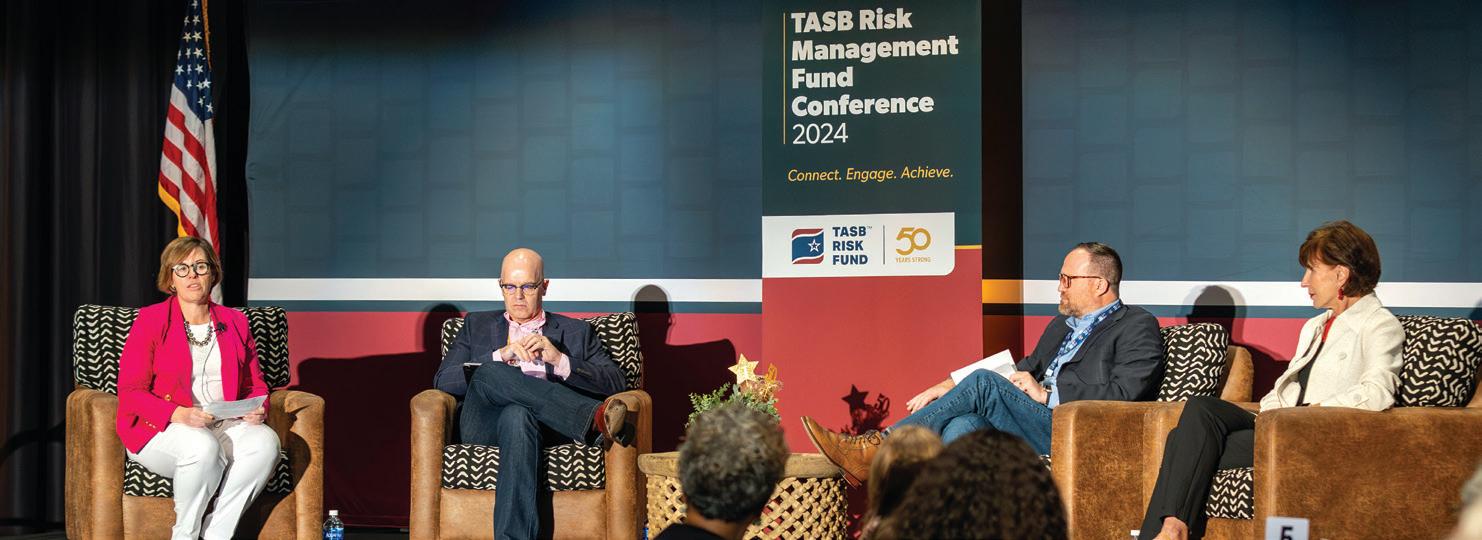
mentation plans,” said Jeff Clemmons, division director of TASB Facility Services, who co-presented Facilities Management: How to Take the Long View. “They start thinking and identifying: What do we do? How do we prepare for the future?”
Clemmons was joined by Kim Shelly, a TASB property claims representative, and the pair walked attendees through the possible challenges they might encounter and how an educational facility assessment and a long-range facility plan might help avoid larger, more costly issues.
Broader discussions
While the sessions offered detailed information about specific topics, participants also came together for larger discussions.
Barrett moderated a special panel called Perspectives on 50 Years of Texas Risk Pooling. She was joined by Dubravka Romano, who retired in 2022 from TASB Risk Management Services and is the founder and principal at Romano Strategy Advisors in Austin; Michael Shannon, senior director of risk management services for the Texas Association of Counties Risk Management Pool; and Jeff Thompson, executive director of the Texas Municipal League Intergovernmental Risk Pool.
Barrett asked the panelists to discuss emerging risks, and cybercrime and security topped the list.
“Security has become the number-one thing that everybody is watching, right?” Shannon said. “Data security, security of information, security of your people, security of your buildings: it’s all intertwined. So, I think that’s going to be the biggest risk.”
The first day of the conference culminated in a special dinner celebrating the Fund’s 50th anniversary, highlighting the strength of its members with a State of the Fund speech by Barrett. Earlier in the day, special recognition was given to districts that had received Excellence Awards over the last 20 years for innovative ways to mitigate risk.
Longview ISD Trustee Ted Beard, a TASB past president who serves as chair of the TASB Risk Management Fund Board, said he was encouraged by the range of ideas shared at the conference and the commitment among participants to do everything possible to address risk management challenges in their school districts.
“This event brought so many people together to share practical solutions and experiences,” Beard said. “I’m confident that these conversations are going to continue, and it’s exciting to know that this conference was such a catalyst for collaboration.”H
38 | June 2024 | issuu.com/tasb-org News & Events
Sylvia Wood is a staff writer for Texas Lone Star
Mary Barrett (left), associate executive director of TASB Risk Management Services, moderated a panel on Perspectives on 50 years of Texas Risk Pooling with county and municipal risk pool representatives and Dubravka Romano (right), who retired in 2022 from TASB Risk Management Services.
Photo by TASB Media Services
Educators discuss best practices at virtual event SHARS Conference
That’s a wrap on the 2024 School Health and Related Services conference! This year’s annual event marked 30 years of TASB’s work guiding Texas school districts through the dynamic terrains of school Medicaid.
More than 250 education professionals from across the state gathered virtually to discuss updates and best practices with their peers and other program experts.
The first day of the conference kicked off with TASB experts covering topics such as personal care documentation, random moment time study training, documenting Individualized Education Programs, and navigating enrollment roadblocks. Sessions on operating procedures success and a journey through Medicaid Administrative
Claiming (MAC) rounded out the day.
The second day featured guest speakers Angela Foote, a SHARS auditor at the Texas Education Agency; Jenny Millward, executive director of the National Alliance for Medicaid in Education; and Karlyn Keller, division director for TASB Special Education and Student Solutions. Each speaker provided unique insight into the future of SHARS and tools to help attendees navigate their school district’s program.
The two-day conference concluded with the announcement that TASB Special Education Solutions is being renamed TASB School Medicaid Services. The new name reflects the team’s wide expertise and the services offered. TASB will continue to help districts execute a compliant program that maximizes
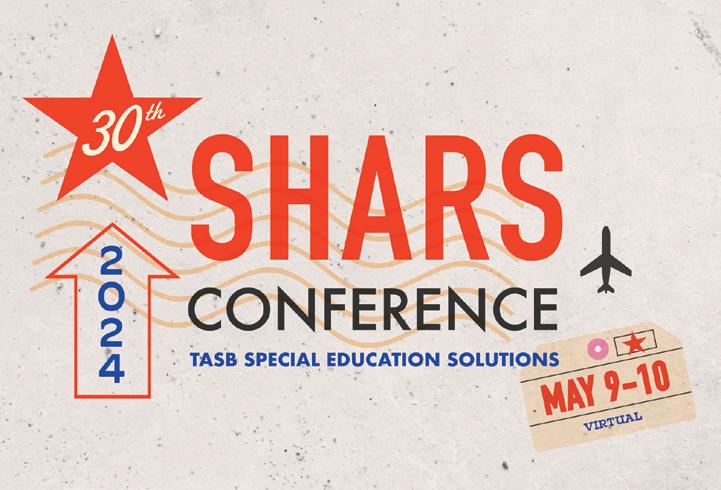
Medicaid-eligible reimbursements.
Attendees were encouraged to save the date for the 31st SHARS Conference May 8-9, 2025.
Interested in learning more about a SHARS membership? Call the team at 888-630-6606 or visit tasb.org/ school-medicaid H
issuu.com/tasb-org | June 2024 | 39
Medicaid ices School Medicaid Services School MedicaidServices School MedicaidServices School MedicaidServices School MedicaidServices School Medicaid Services School MedicaidServices School Medicaid Services TASB Special Education Solutions is now TASB School Medicaid Services, reflecting the team’s expertise
30 years supporting districts in school Medicaid.
and
Bulletin Board
SBOE Acts on Dyslexia and CTE Programs Support
The Texas State Board of Education has adopted rules that enable improved supports for students with dyslexia and approved a plan to strengthen career and technical education.
The updates to Dyslexia Handbook: Procedures Concerning Dyslexia and Related Disorders align with House Bill 3928 to ensure clearer guidelines for dyslexia evaluation, identification, and instruction. The guidelines also address the qualifications and training requirements for professionals identifying and working with students with dyslexia. The handbook will go into effect 20 days after filing with the Texas Register.
In April, the board also approved the Texas State Plan for Strengthening Career and Technical Education for the 21st Century Act (Perkins V.) The act requires state agencies receiving federal Perkins funds to submit a state plan to the U.S. Department of Education every four years. TEA and the Texas Higher Education Coordinating Board worked to update Texas’s state plan, including incorporating the recently refreshed Career and Technical Education programs of study, defining local levels of performance, and aligning to relevant strategic updates in Texas such as the Tri-Agency Workforce Initiative goals and strategies. TEA will now submit the updated plan to the USDE. The plan is set to go into effect for school years 2024-25 through 2027-28.
The SBOE also honored Keven Ellis (District 9) with a resolution thanking him for his time as board chair. A board member since 2016, Ellis served two terms as chair.
The SBOE will reconvene June 25-28.
TEA to Host Foster Care and Education Summit
The Texas Education Agency is hosting its second Foster Care and Education Summit in San Angelo Sept. 26-27.
The summit will include training, guidance, resources, and practices to assist local education agencies and child welfare organizations with addressing the educational needs and requirements of students in foster care, as required by Every Student Succeeds Act of 2016.
Topics scheduled to be covered include transportation, school of origin determination, education decision-making, and other education-focused foster care content. The Region 15 Education Service Center and Angelo State University are assisting in planning the two-day event.
TASB’s Executive Search Services is currently accepting applications for the positions listed below:
For information about vacancies or services provided by TASB’s Executive Search Services, call 800-580-8272, email executive.search@tasb.org. Hutto ISD: Superintendent Deadline: June 25
San Benito CISD: Superintendent Deadline: TBD
Socorro ISD: Superintendent Deadline: June 17
University of Texas at Austin High School Special District: Superintendent Deadline: TBD
United ISD: Superintendent Deadline: TBD

We want to recognize school board members’ extraordinary work in TLS!

If you have received any awards or honors, please send your news and photos to tls@tasb.org
40 | June 2024 | issuu.com/tasb-org

Wading through data, comparing options, and deciding on a health plan for your employees can be confusing. Let us do the forensic analysis for you. Our experts will assess your current plan, research available options – even submit RFPs for you – all to help you find the right combination of benefits to best suit your unique needs.
TASB Benefits Cooperative
• Specializes in serving Texas school districts
• Is a voice of reason
• Has a wealth of experience in navigating health plans
• Committed to providing friendly service
Professional development for your special populations programs
Our team of experts can provide executive coaching and/or professional development for any staff, customized to meet your district’s needs. Training topic examples include:
• Special Education 101 for Board Members
• Top 10 Issues in Special Education
• Best Practices in Special Populations Areas
• Compliance Strategies
• Leadership
• Any area of district identified need

issuu.com/tasb-org | June 2024 | 41 Contact our team to set up your training.
tasb.org/student-solutions 888-247-4829 studentsolutions@tasb.org
Let’s talk about your options. 800-558-8875 | TASBBenefits.com customer.service@tasbbenefits.com Unsure if you have the best health plan for your district?
School board members make up the largest group of elected public officials in Texas. As unpaid volunteers, they are deeply involved in their communities and committed to their districts and students.
Texas school boards are at the heart of local governance. They truly represent the concept of “government closest to the people governs best.”
Trustees come from all walks of life and represent all parts of Texas. In fact, in every region and town across the Lone Star State community members have the opportunity to vote for their school board trustees to oversee their schools. Voting in school board elections connects the individual citizen to the school in a direct way and gives the voters an opportunity to hold their school trustees accountable.
School Board Members by the Numbers
Total Number of Board Members
Board Members by Gender
Board Members by Total Tenure
Between 11 and 20 years
Between 6 and 10 years
Between 3 and 5 years
Between 1 and 3 years
Less than 1 year
Number of Board Members Grouped by District Average Daily Attendance
But who are trustees in terms of numbers? Texas Lone Star delved into the school board member demographics to provide a snapshot.*
*The data presented are based on TASB’s records as of April 15. These numbers may change based on elections, resignations or other activities not reflected in this recent snapshot.
Source: TASB Planning and Research have the opportunity to vote for their
500 students or less
Between 501 and 2,500 students
Between 2,501 and 10,000 students
10,001 students or more
Average board tenure 1 Year 3 Years 5 Years 10 Years 20 Years
More than 20 years
Board Members Board Members Board
Members Board Members
Female Male
42 | June 2024 | issuu.com/tasb-org
Board Members: MAP YOUR JOURNEY TO SUCCESS
TASB supports trustees at every point along the board leadership journey, offering training and programs to excel at board governance.
New Trustees
Texas Trustee Institute
TTI offers a comprehensive program to build skills, dive into governance, and develop a leadership network.
Key offerings: Texas Open Meetings Act, Board Governance, Consensus Building.
Sessions coming to SLI! Register now! tasb.org/training-events/sli
Master Trustees
Leadership TASB
For experienced trustees, meet with innovative districts and leaders, while learning what makes them successful. LTASB’s one-of-a-kind experience will expand your view of education leadership.
Applications being accepted now! Learn more! leadershiptasb@tasb.org
Foundational Training
Find on-demand courses for new trustees, including the Top 10 Things to Know bundle of essential courses, in the Online Learning Center.
onlinelearning.tasb.org
Experienced Trustees
Board Officer Institute
For veteran trustees and board officers, BOI imparts knowledge and tools for effective and efficient meetings.
Key offerings: Important Tools for Meeting Preparation, Effective Meetings, Focused and Productive Board Discussions.
Sessions coming to SLI! Register now! tasb.org/training-events/sli
Continuing Education
onlinelearning.tasb.org Whole Board Training
Need support with your board self-assessment? Board Development Services’ consultants are here to help! Get training tailored to your district’s needs. board.dev@tasb.org
With the Online Learning Center, you can find courses to support your board service, including Introduction to Parliamentary Procedure, Board Officers Forum, and Advocacy 101 and 201.
For additional information on any of these offerings: 800-580-8272, ext. 2453 • board.dev@tasb.org
onlinelearning.tasb.org
issuu.com/tasb-org | June 2024 | 43
EXPLORE ENGAGE EXPAND

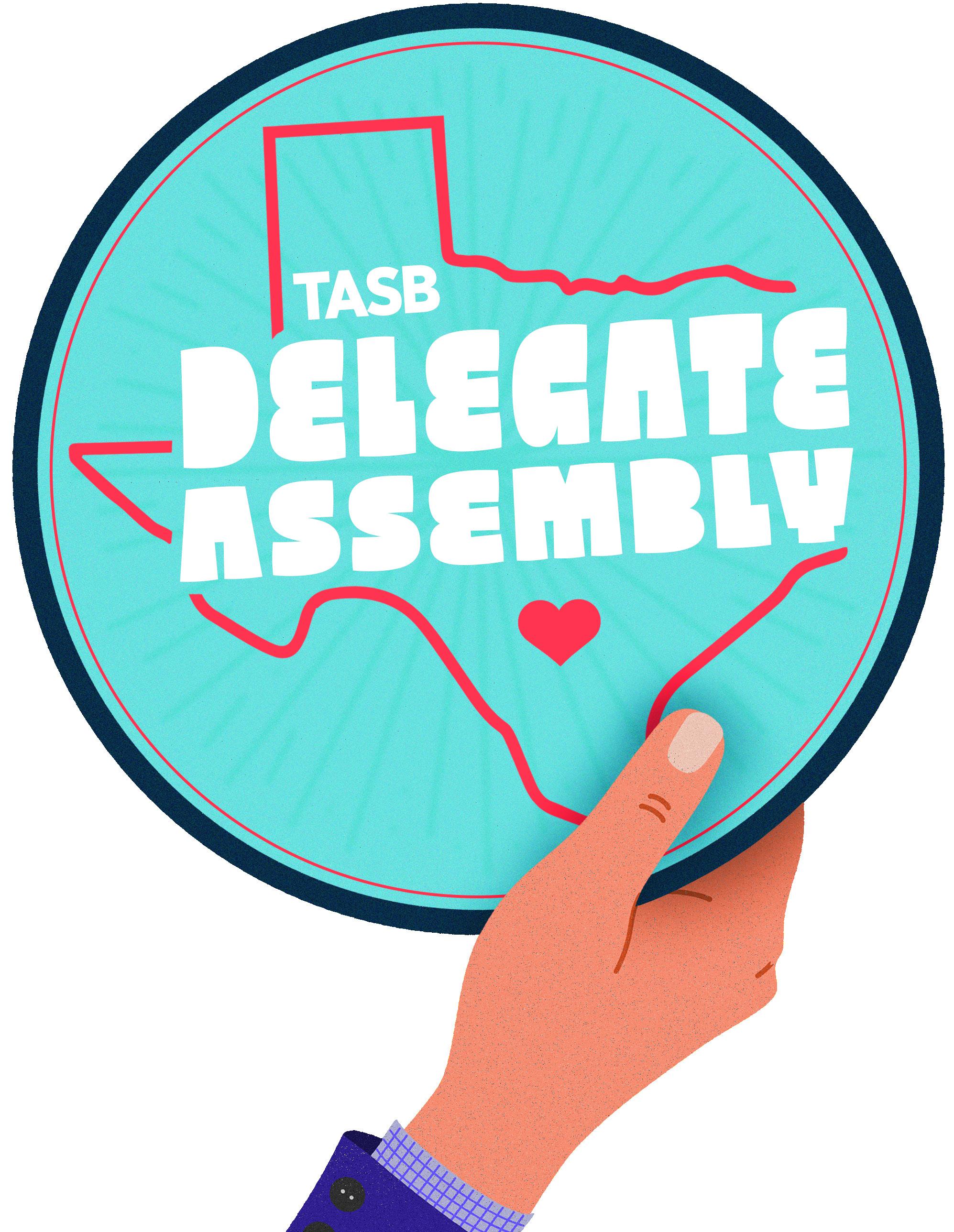
NONPROFIT ORG US POSTAGE PAID AUSTIN TEXAS PERMIT NO 1422 Texas
of School
Box
Sept. 28 San Antonio Your Association. Your Voice. It’s not a meeting. It’s having a voice. Learn how your board can get involved! Visit tasb.org/delegate. I attend Delegate Assembly because I want my board to have a say in the direction of TASB. – Bret Begert, Fort Elliott CISD (Region 16) “ ”
Association
Boards P.O.
400 Austin, Texas 78767-0400














 Tolley
Tolley
 Laura
Laura




















































